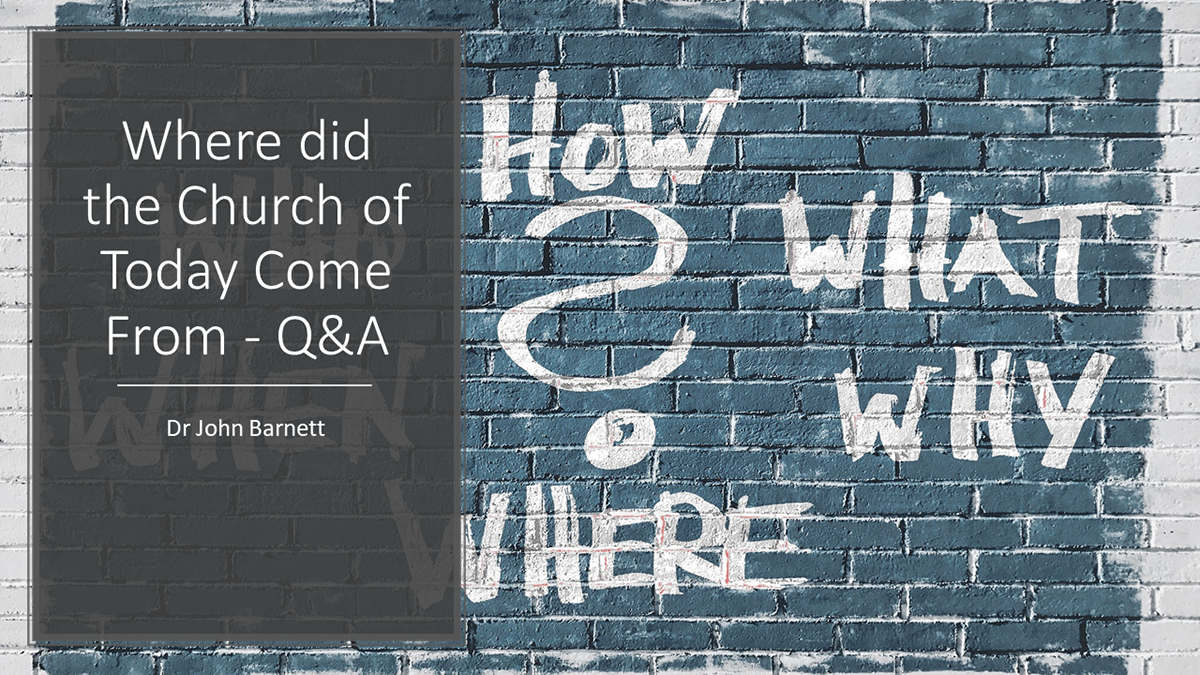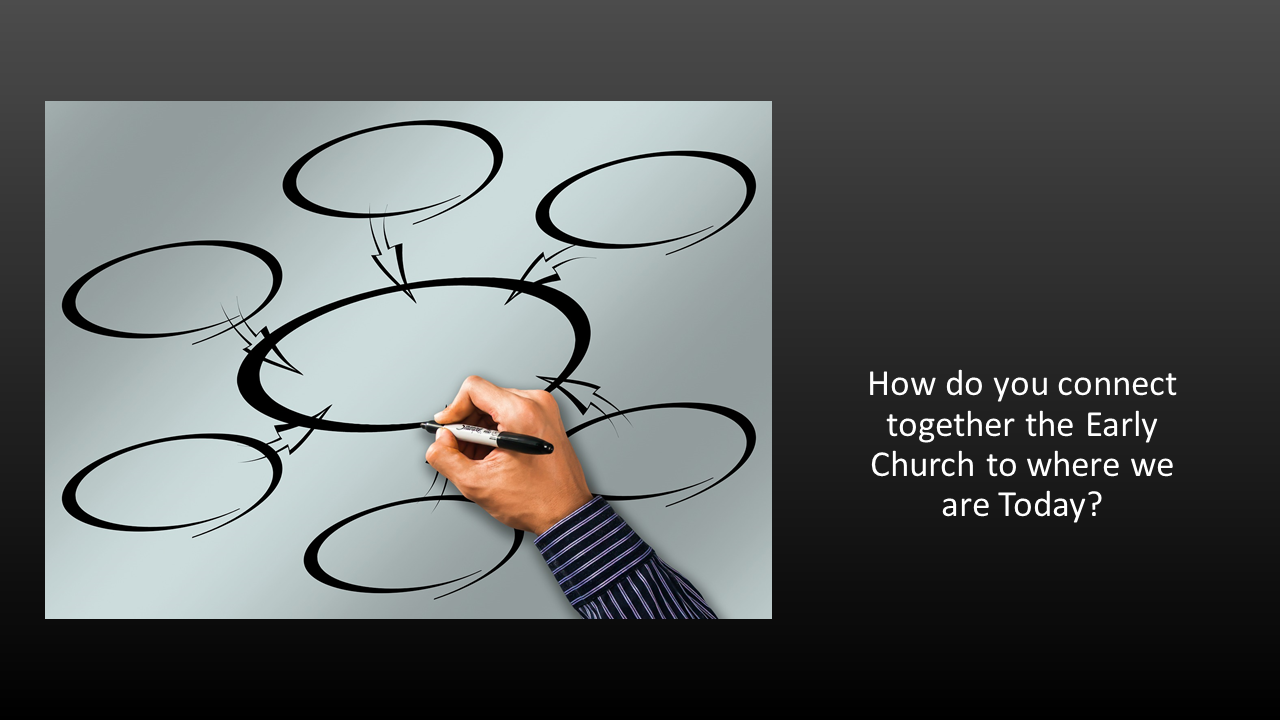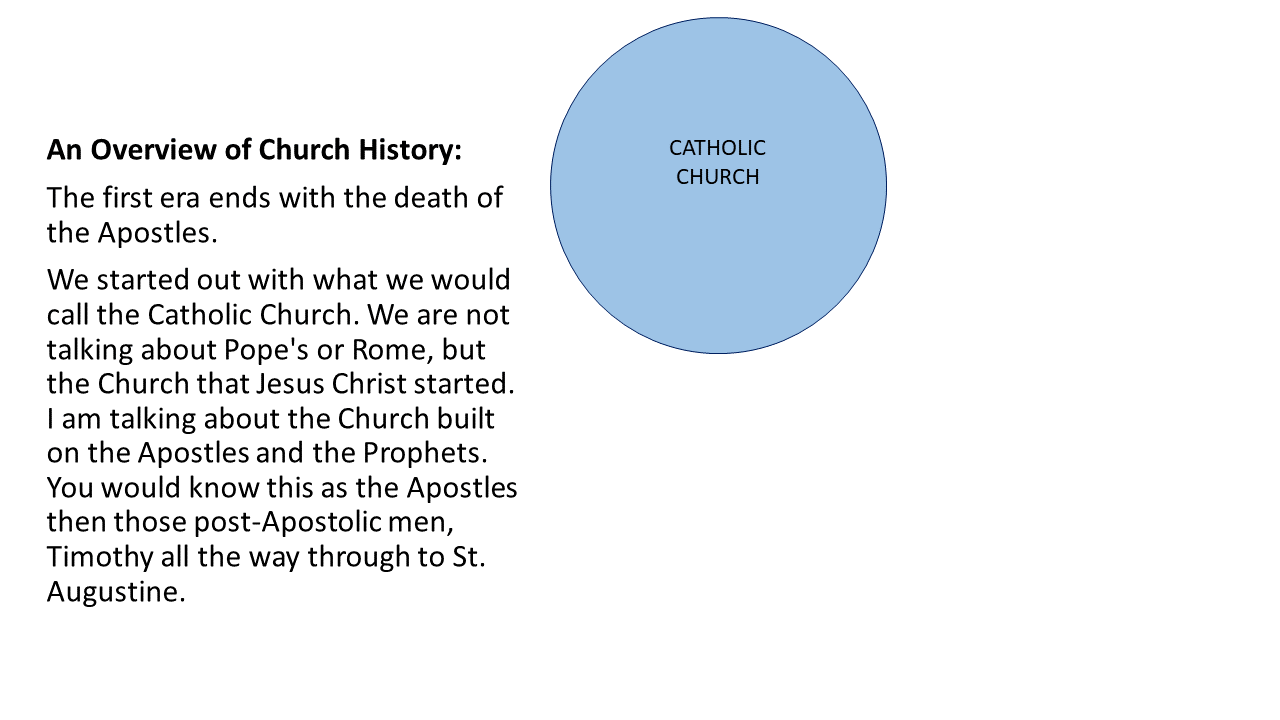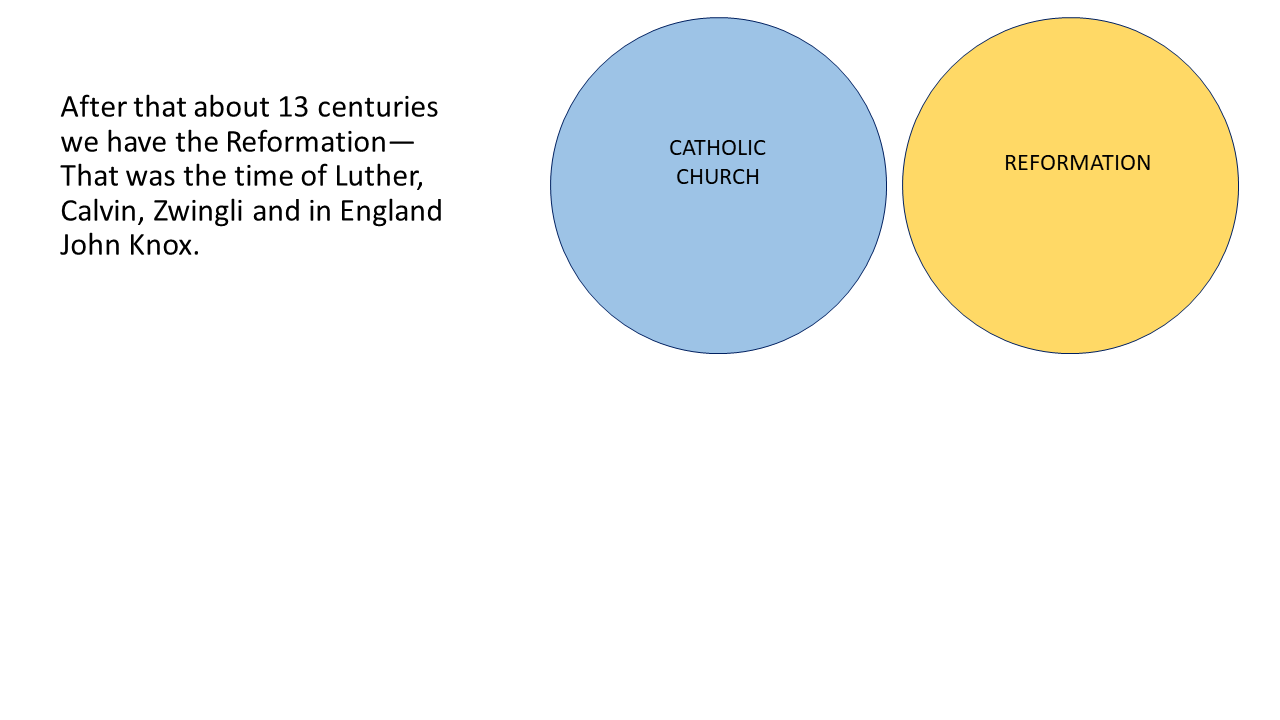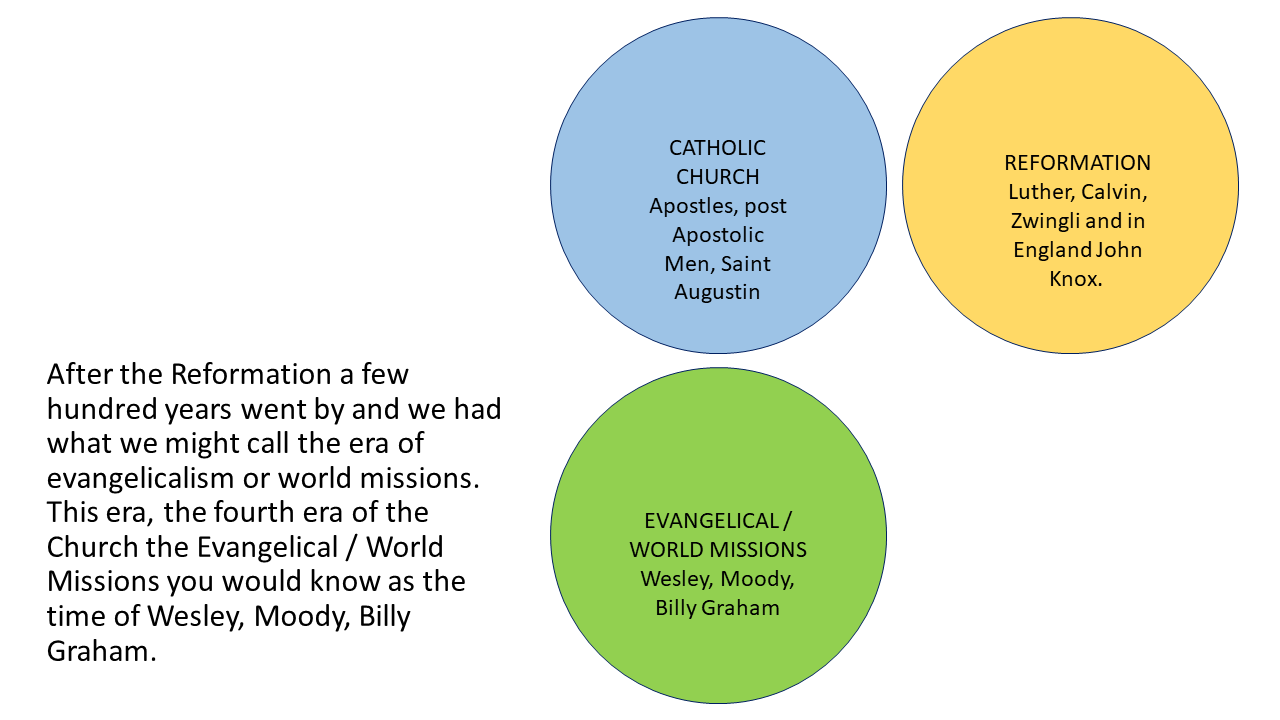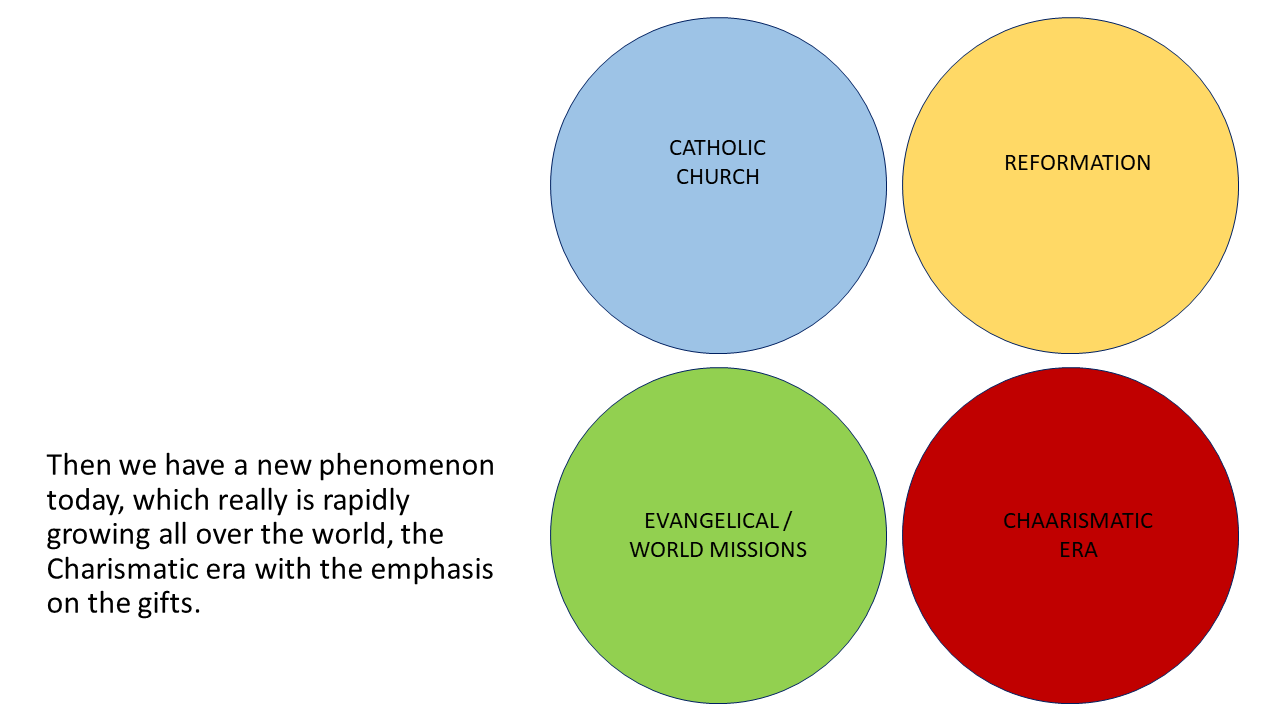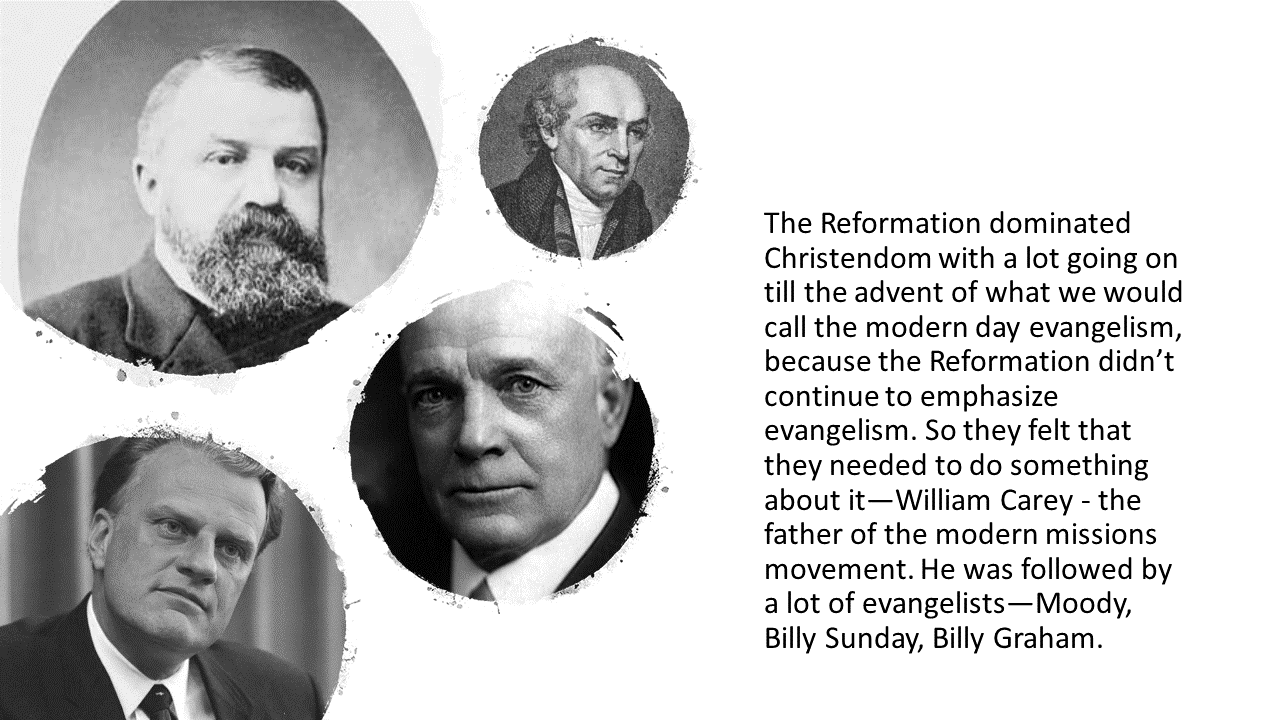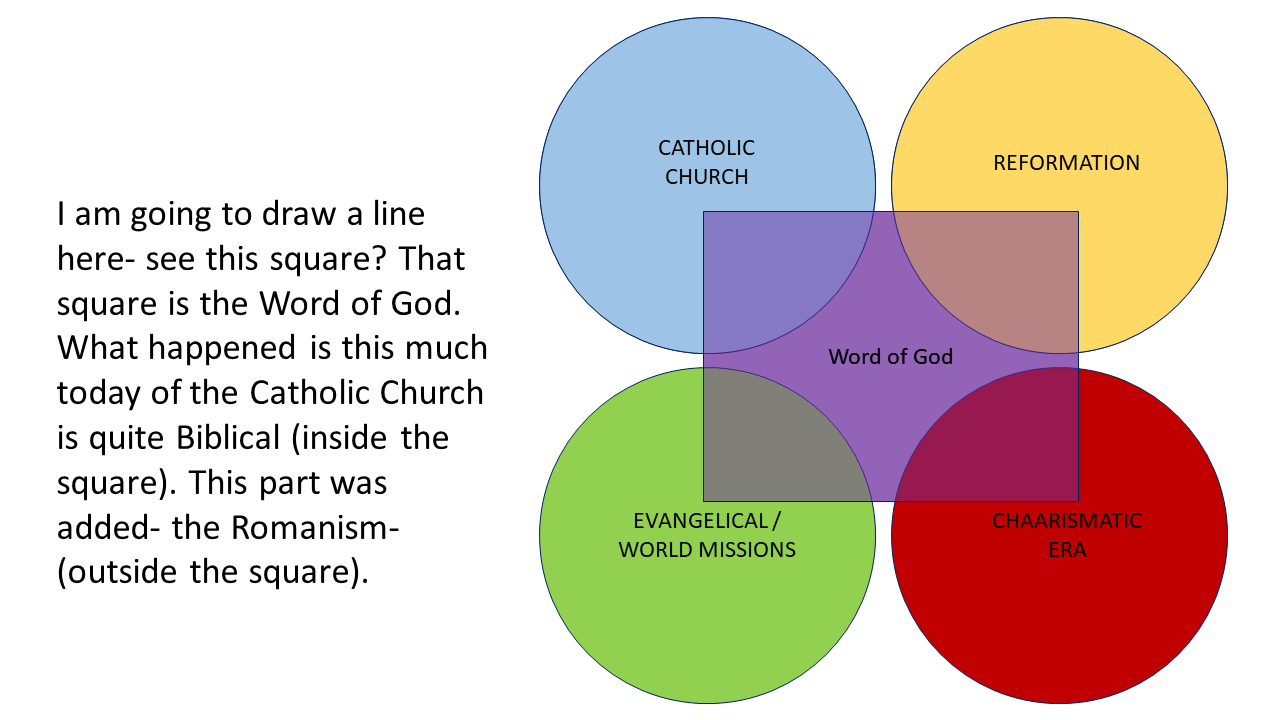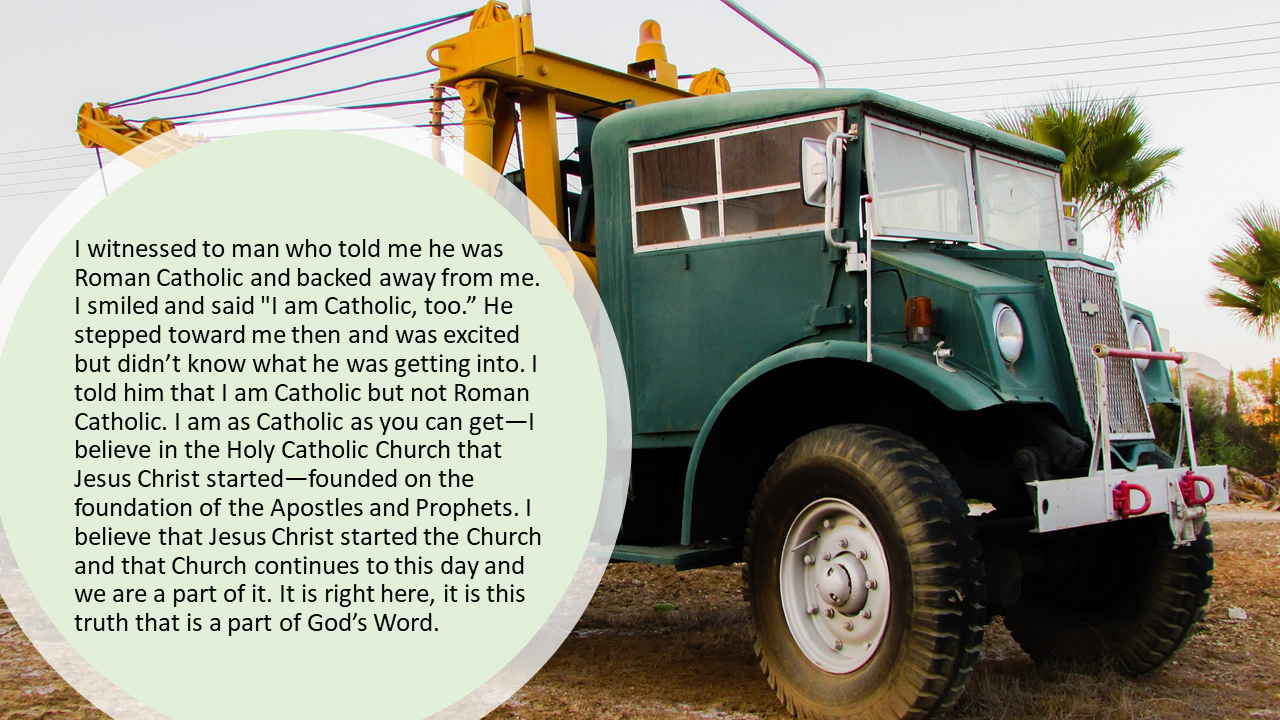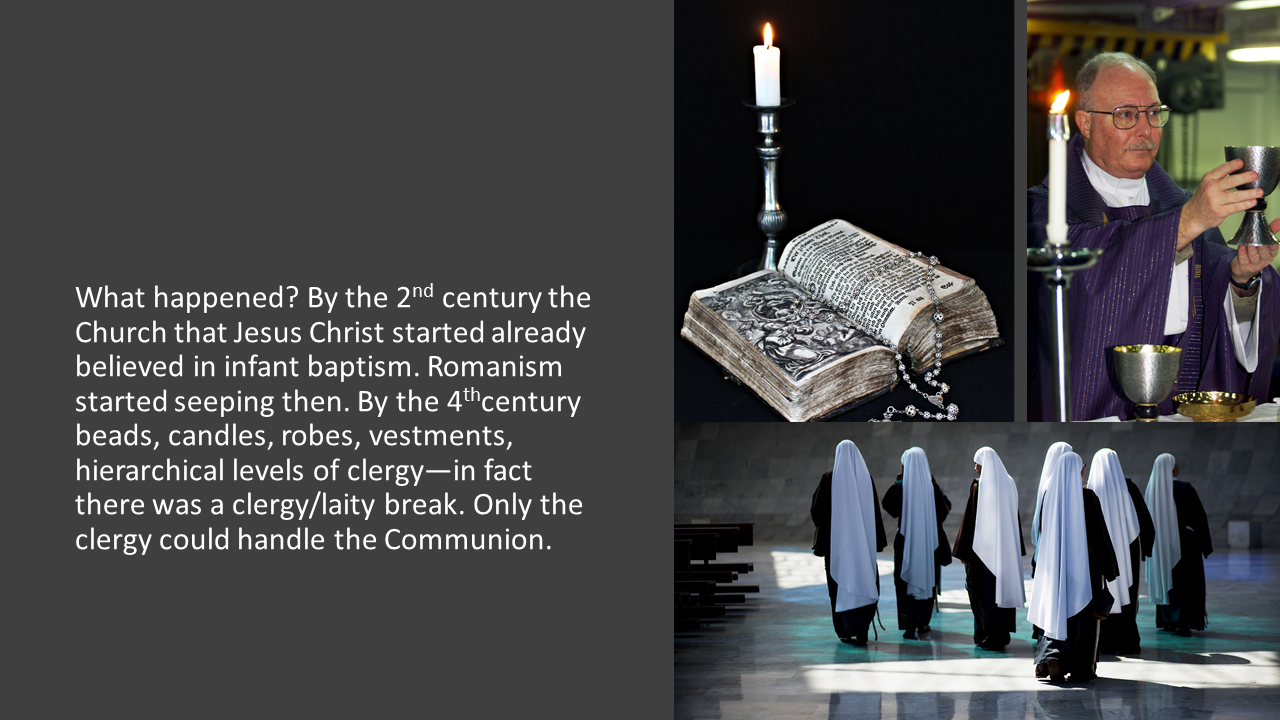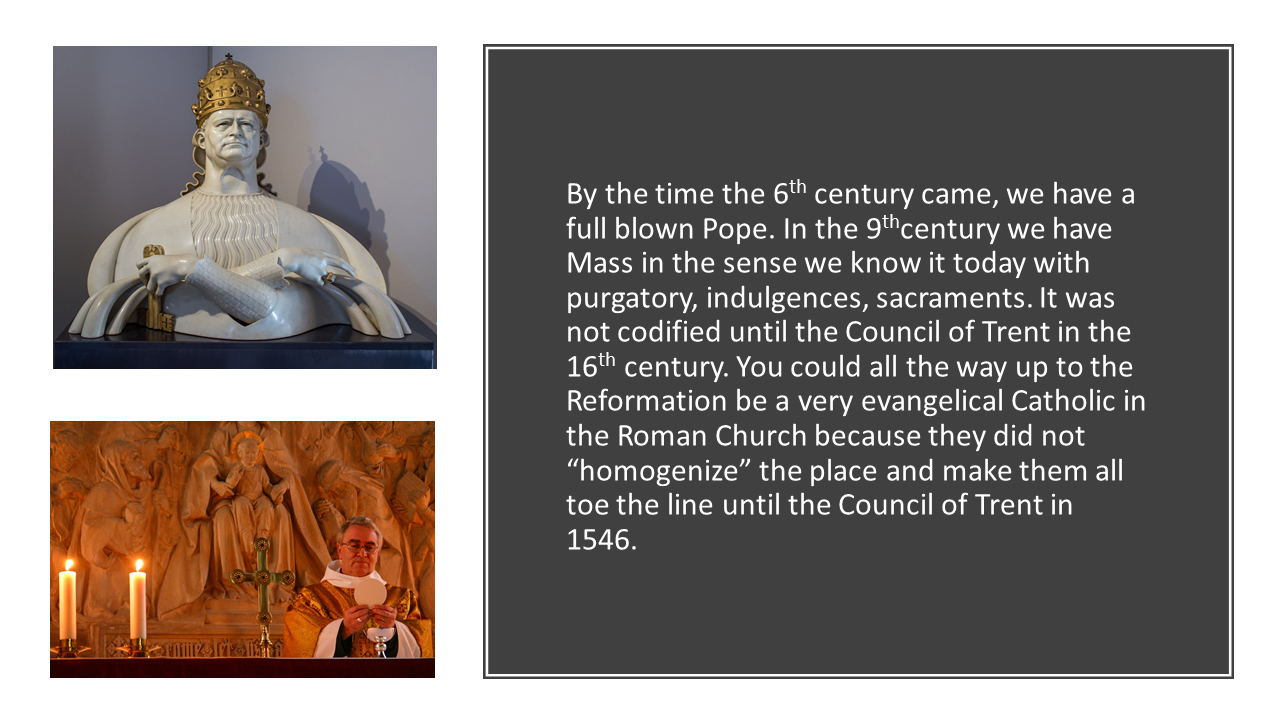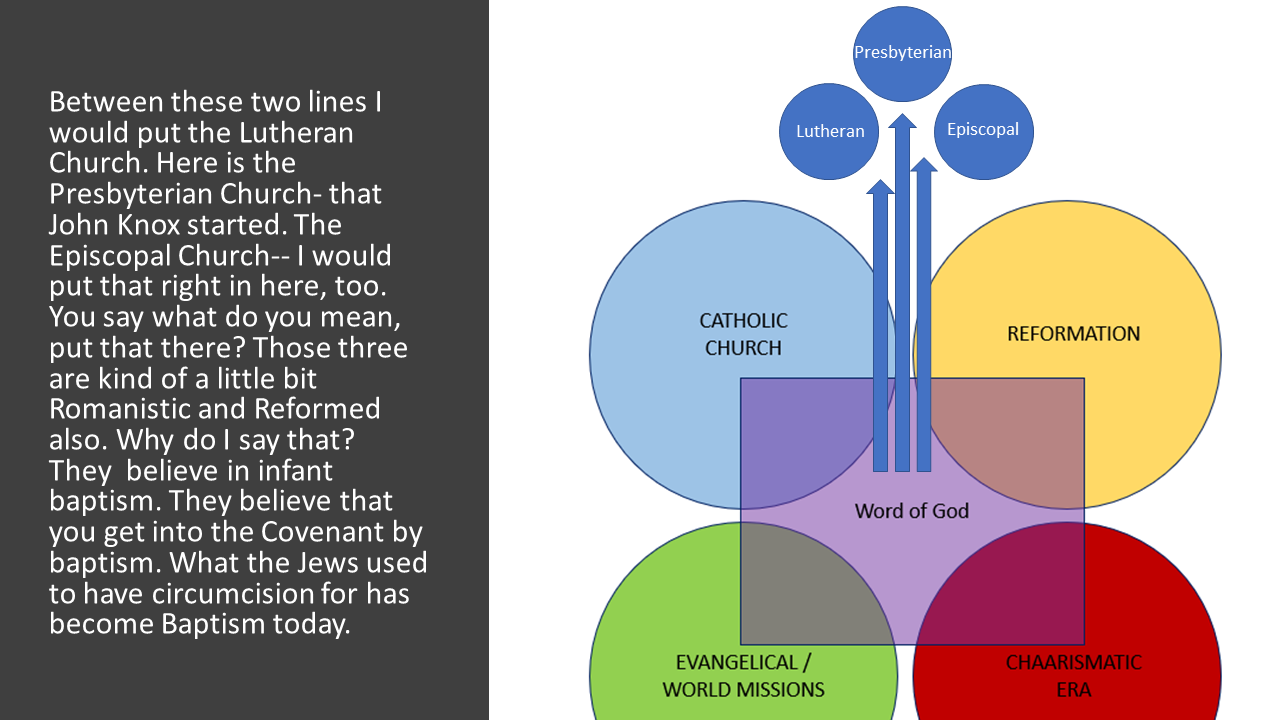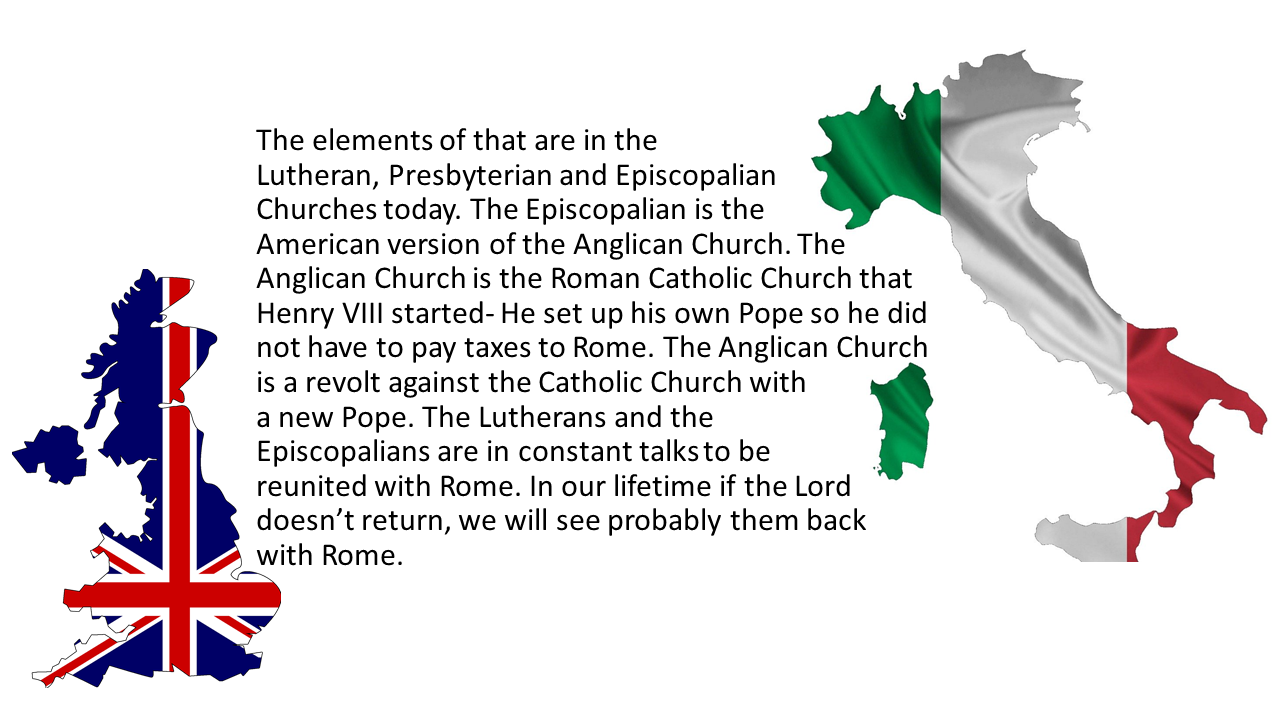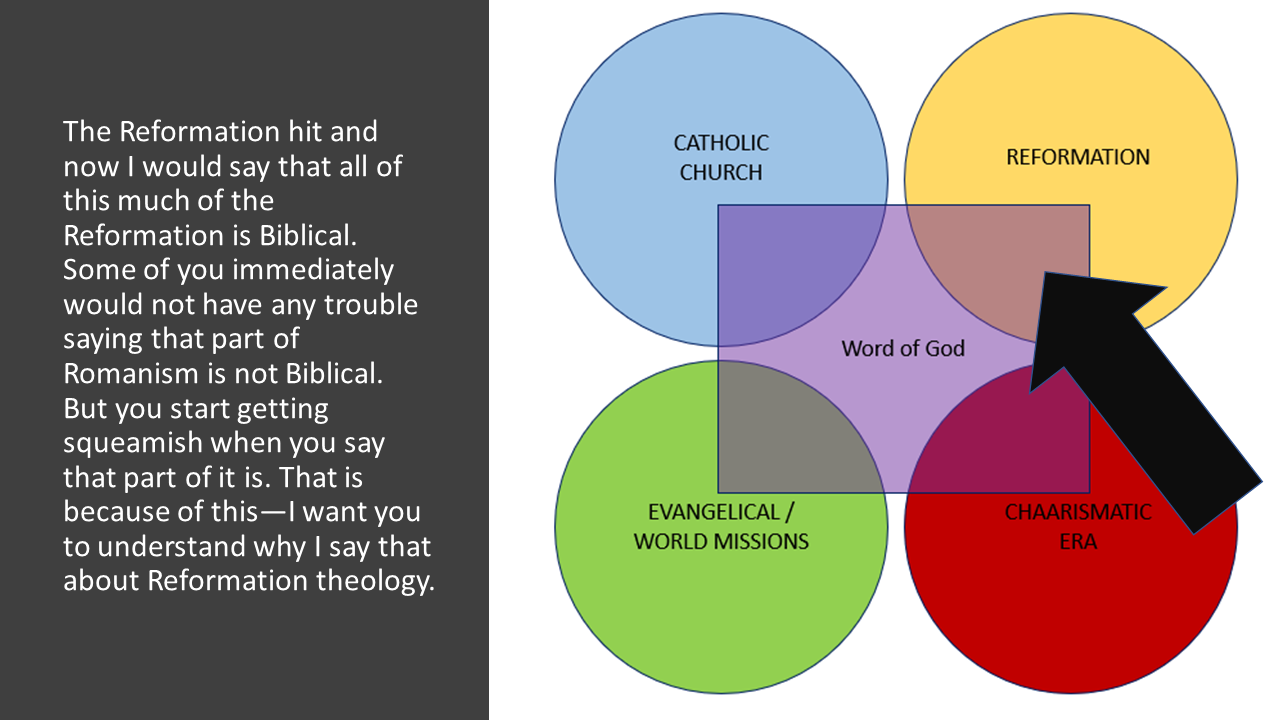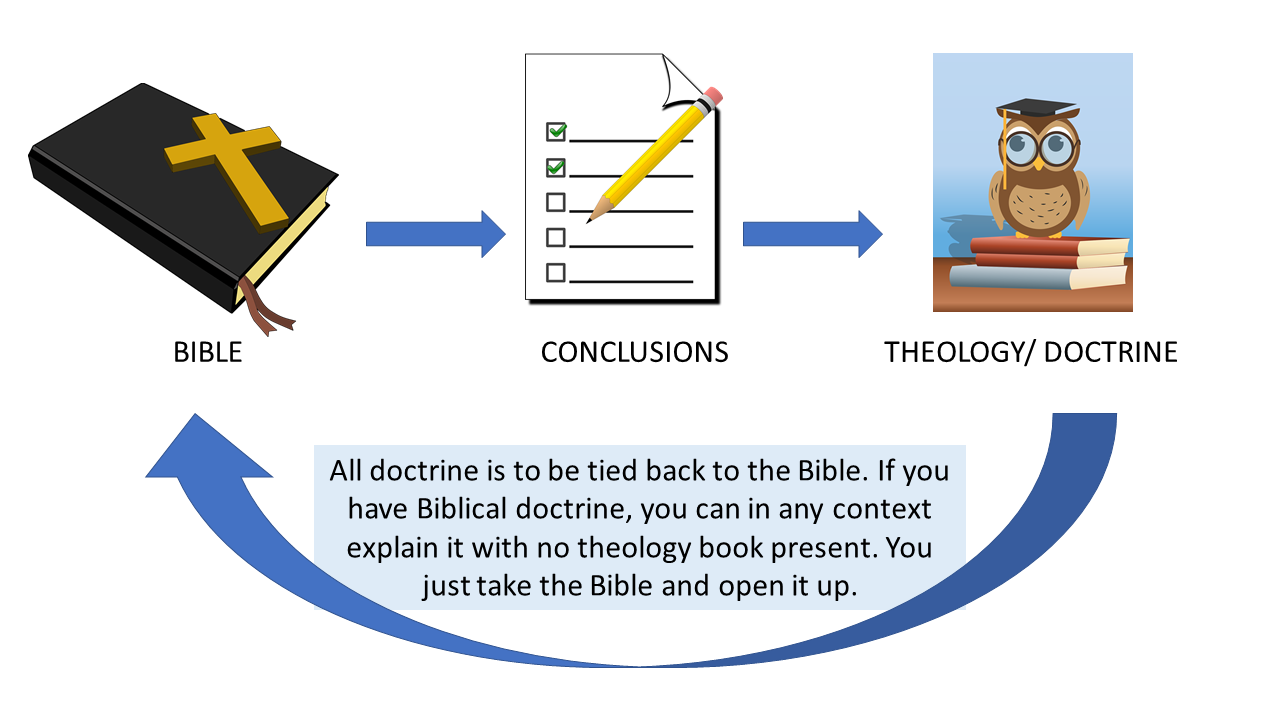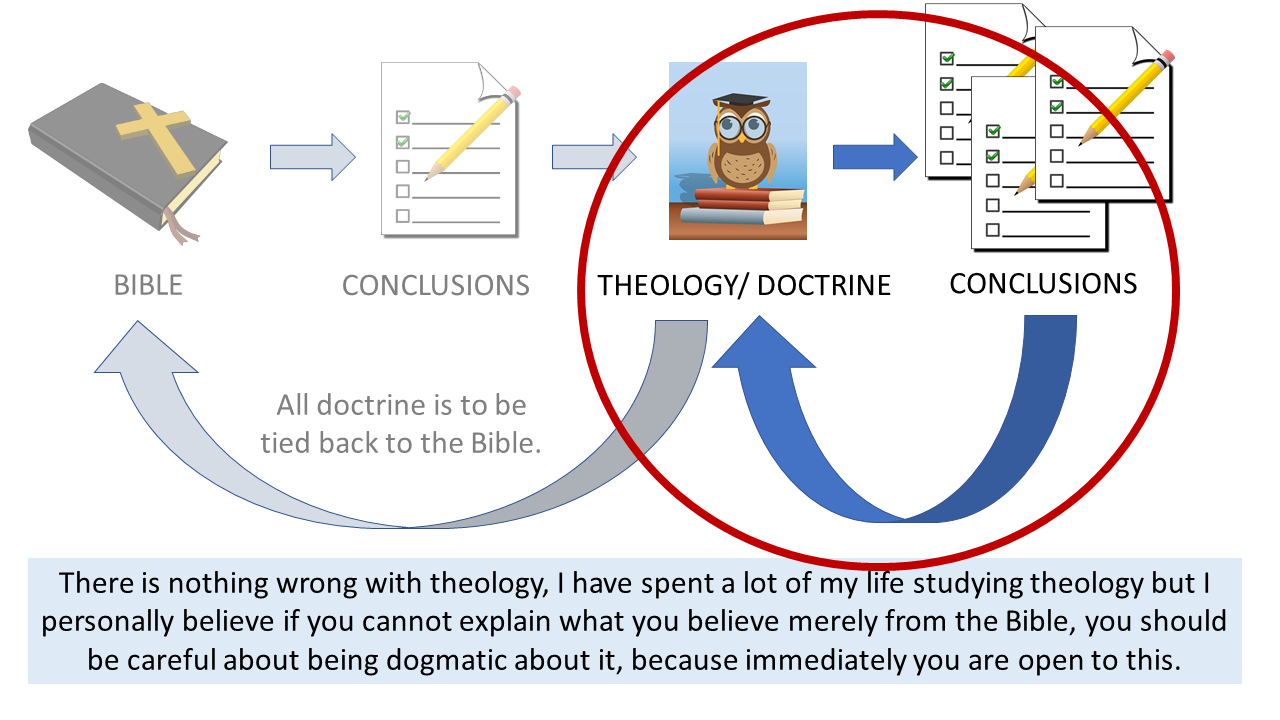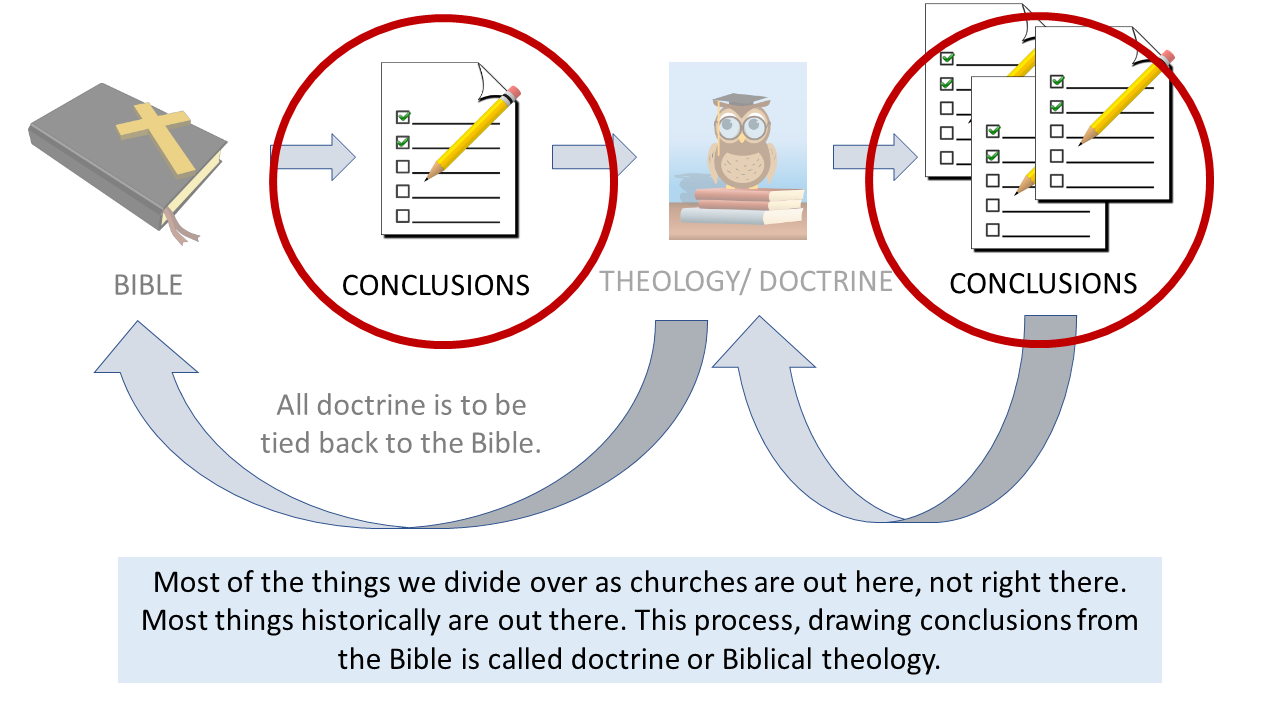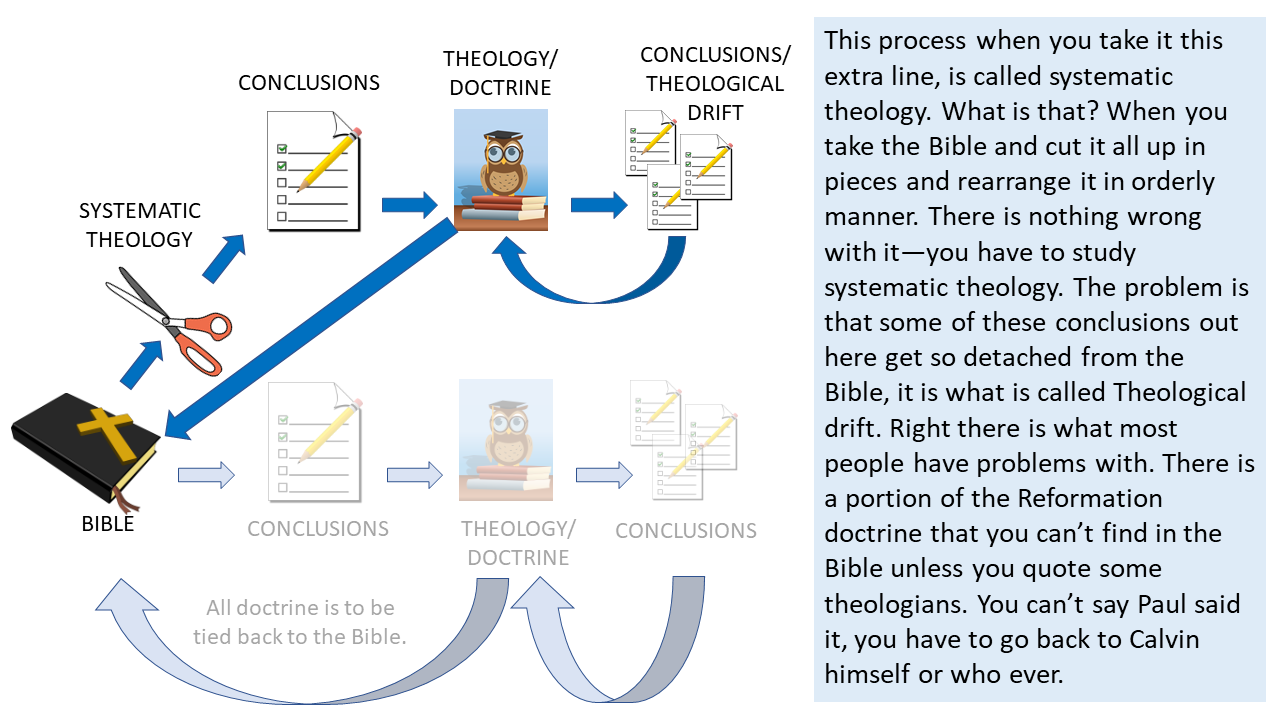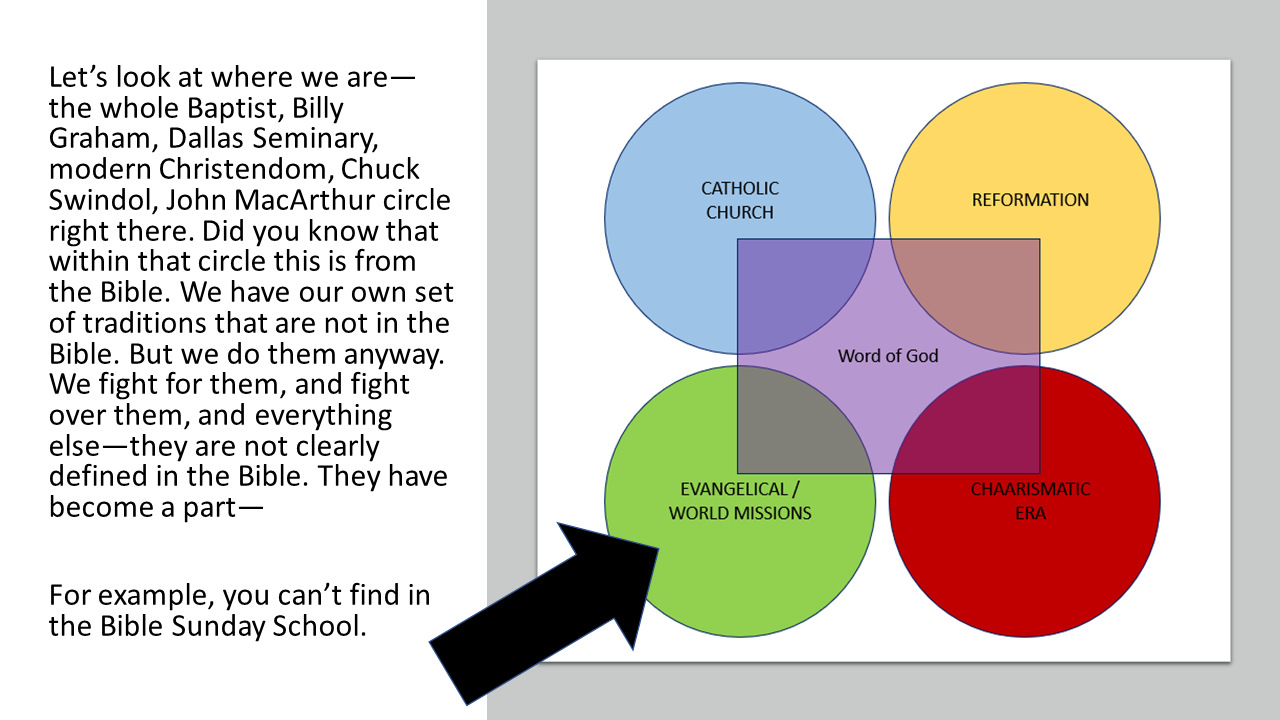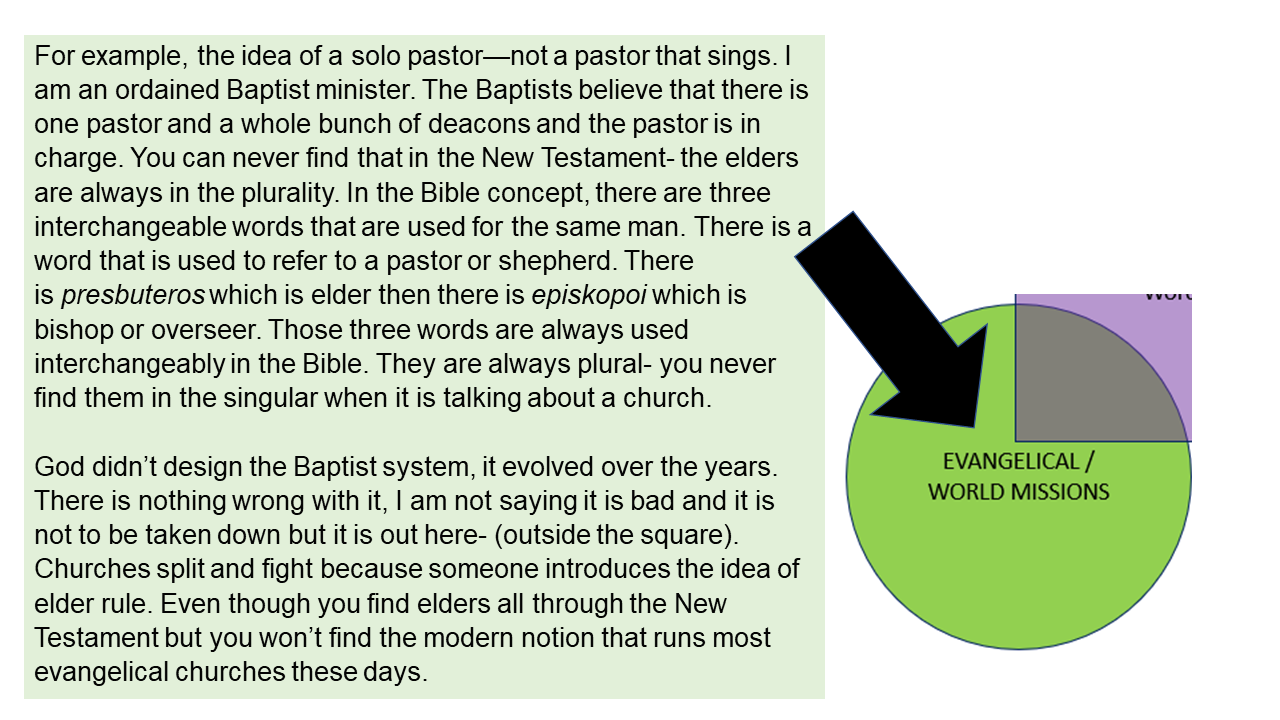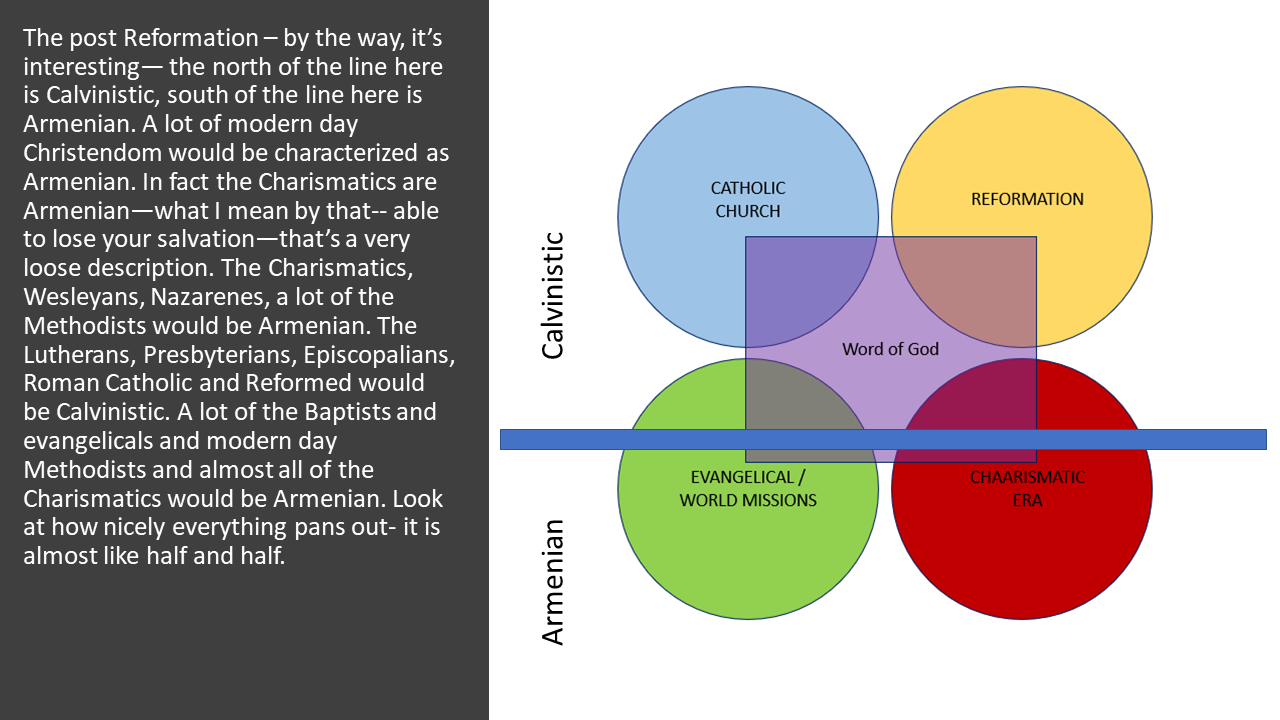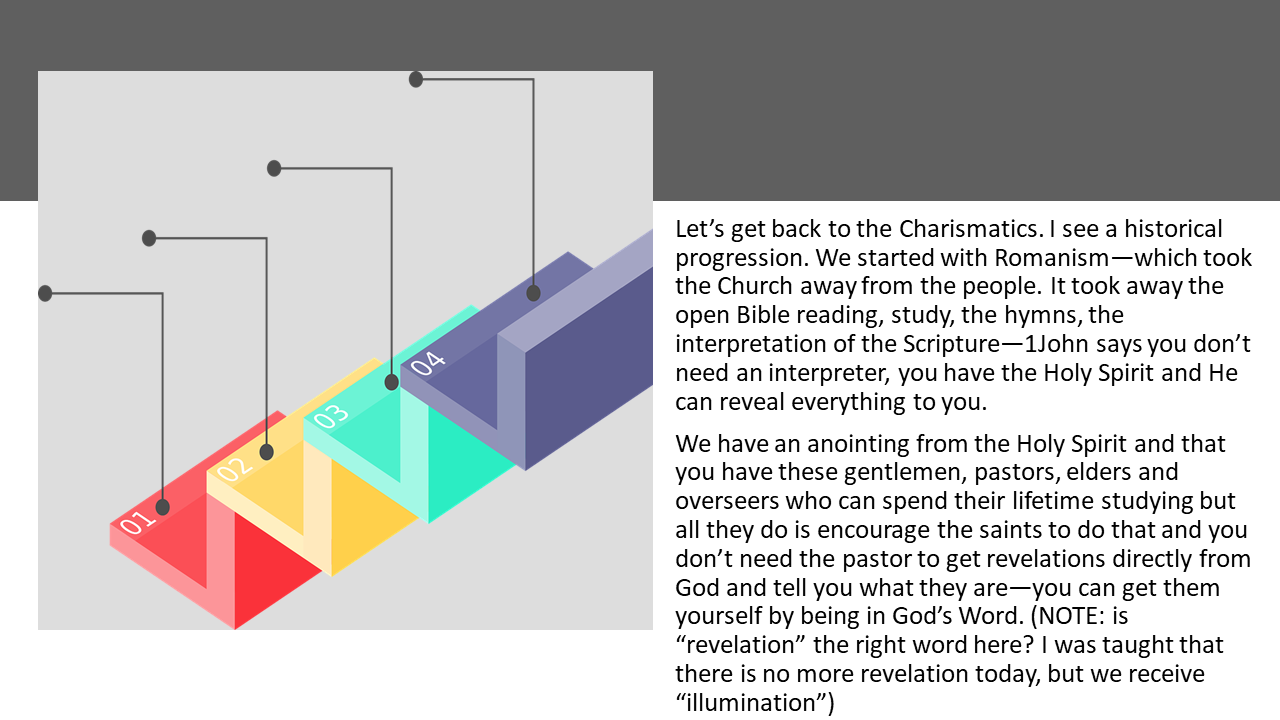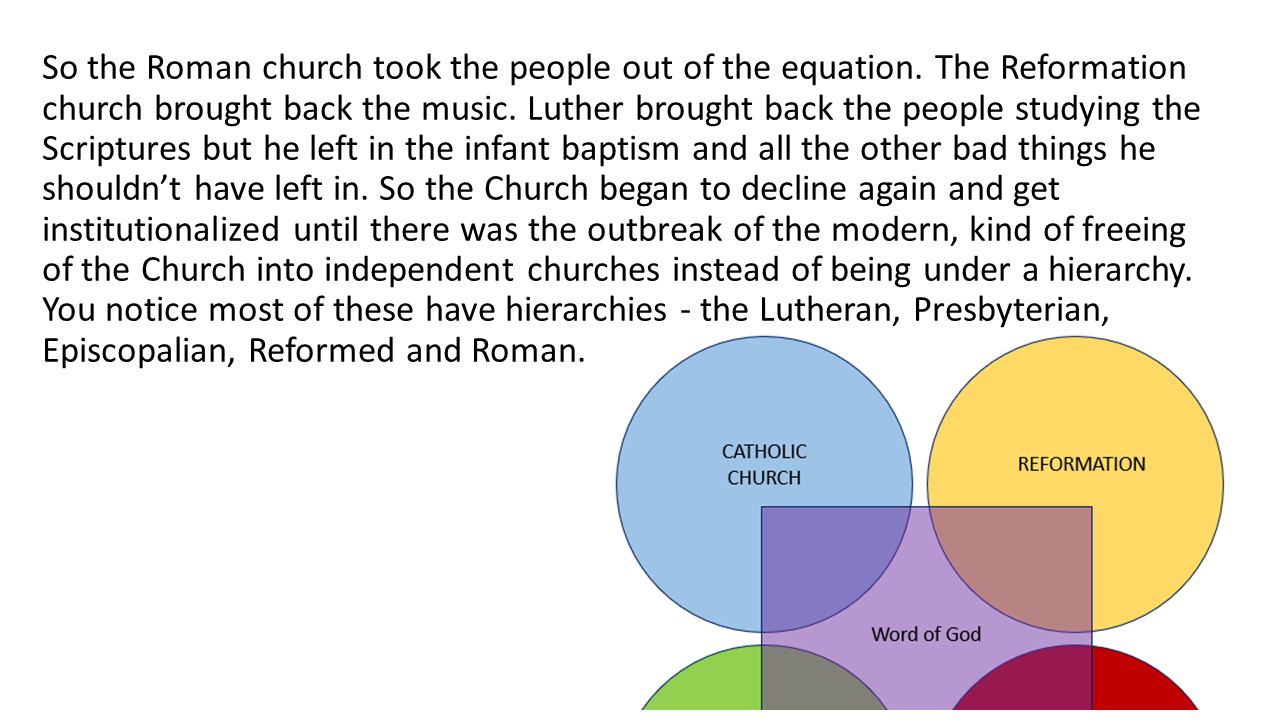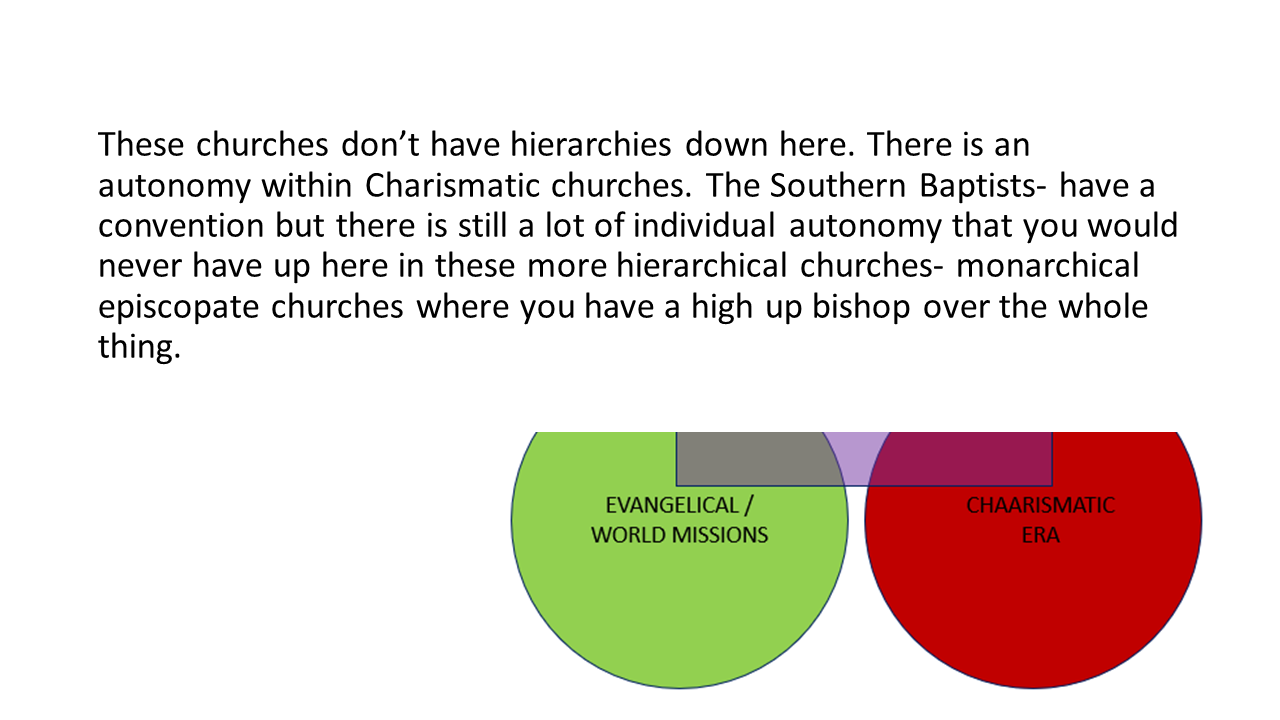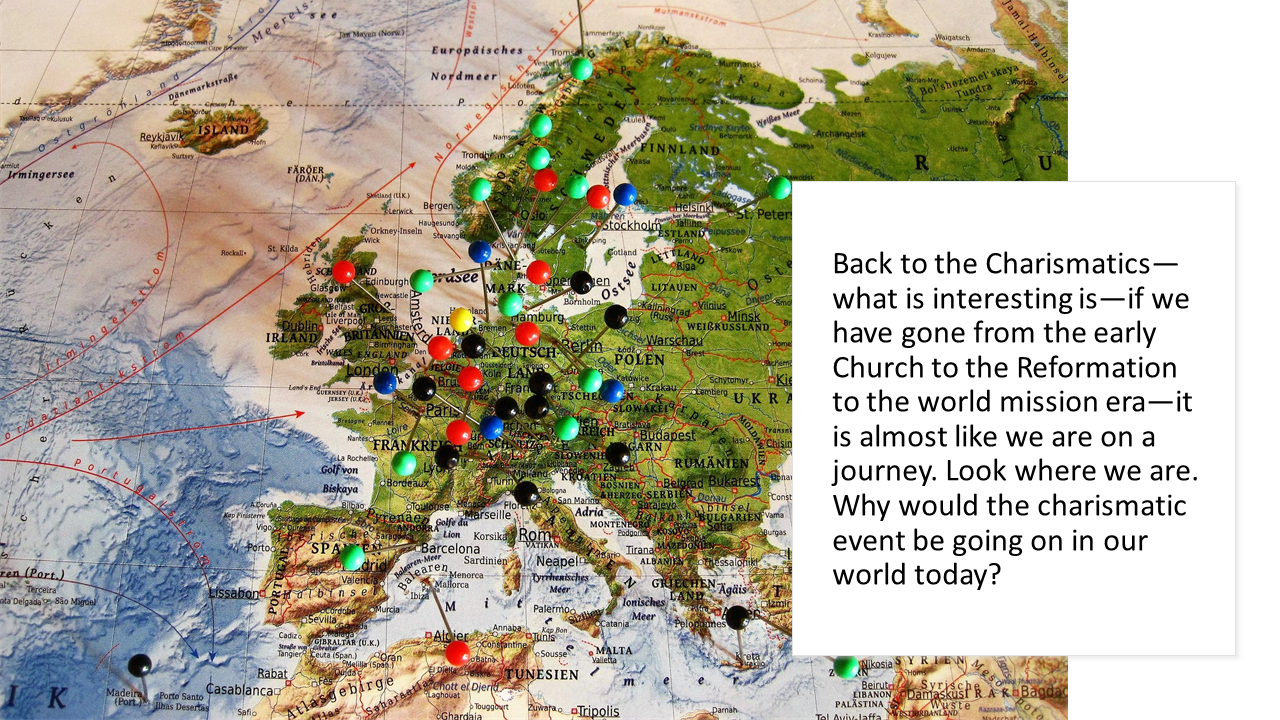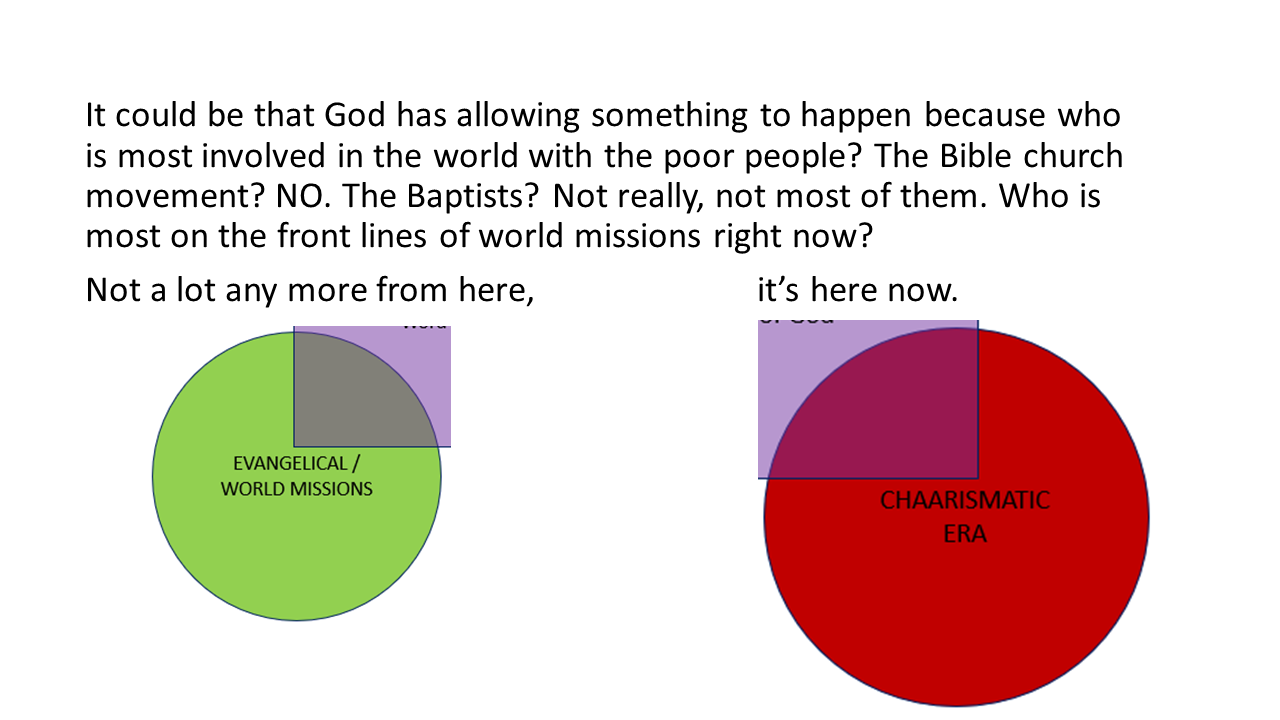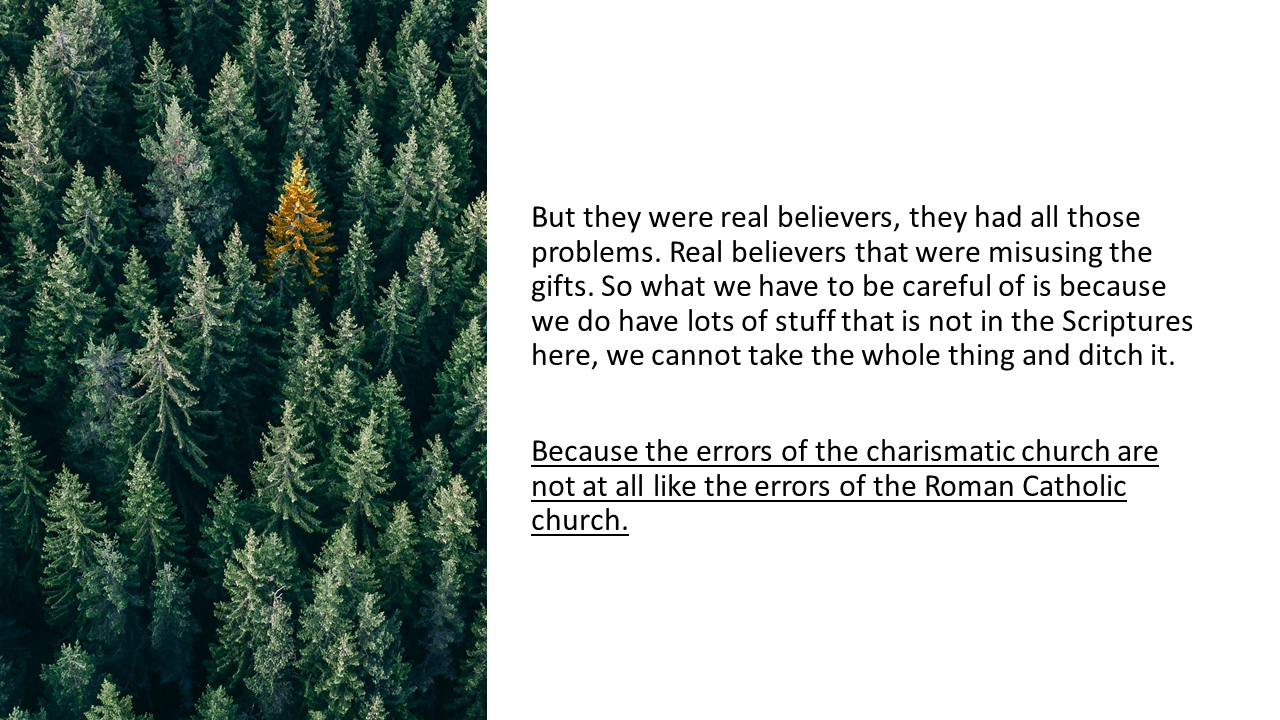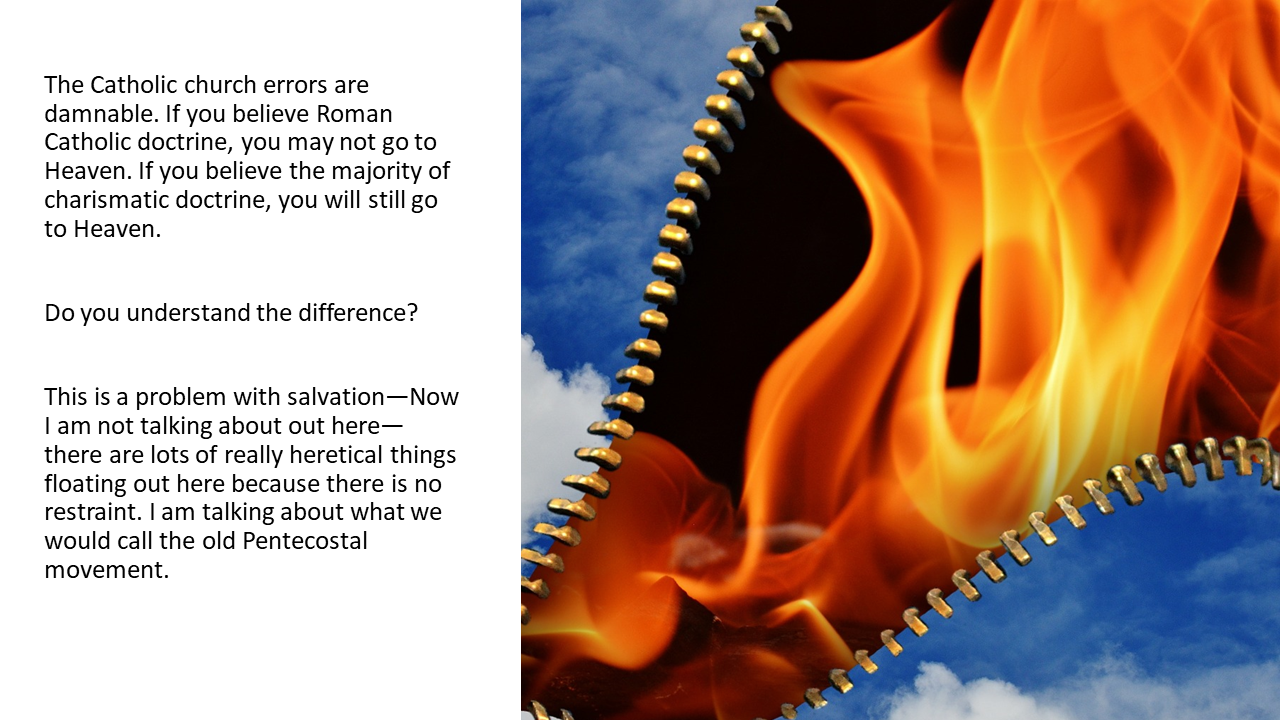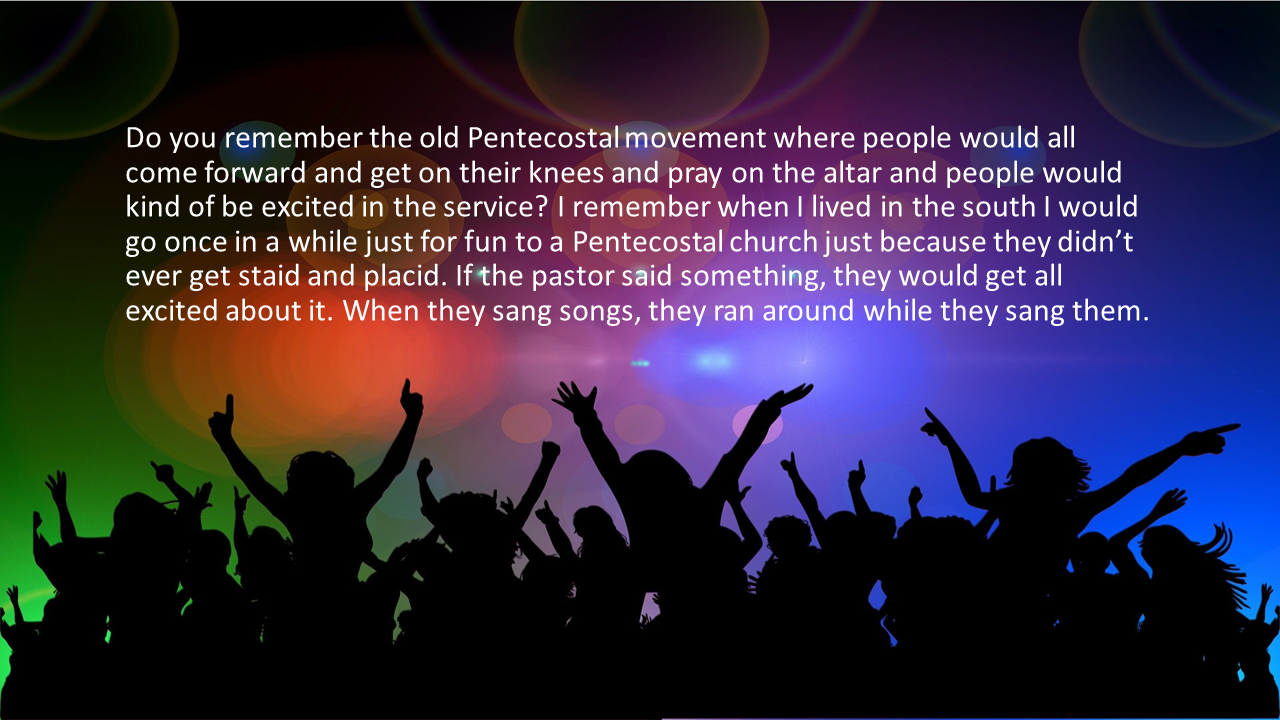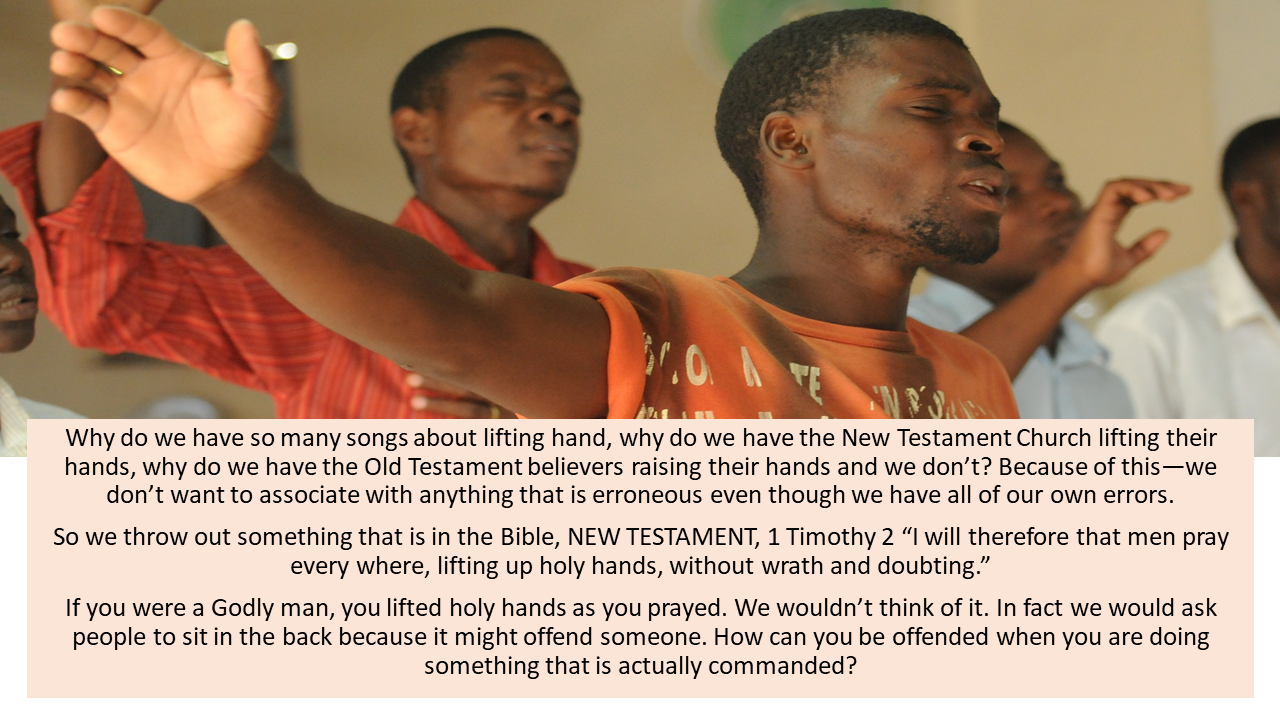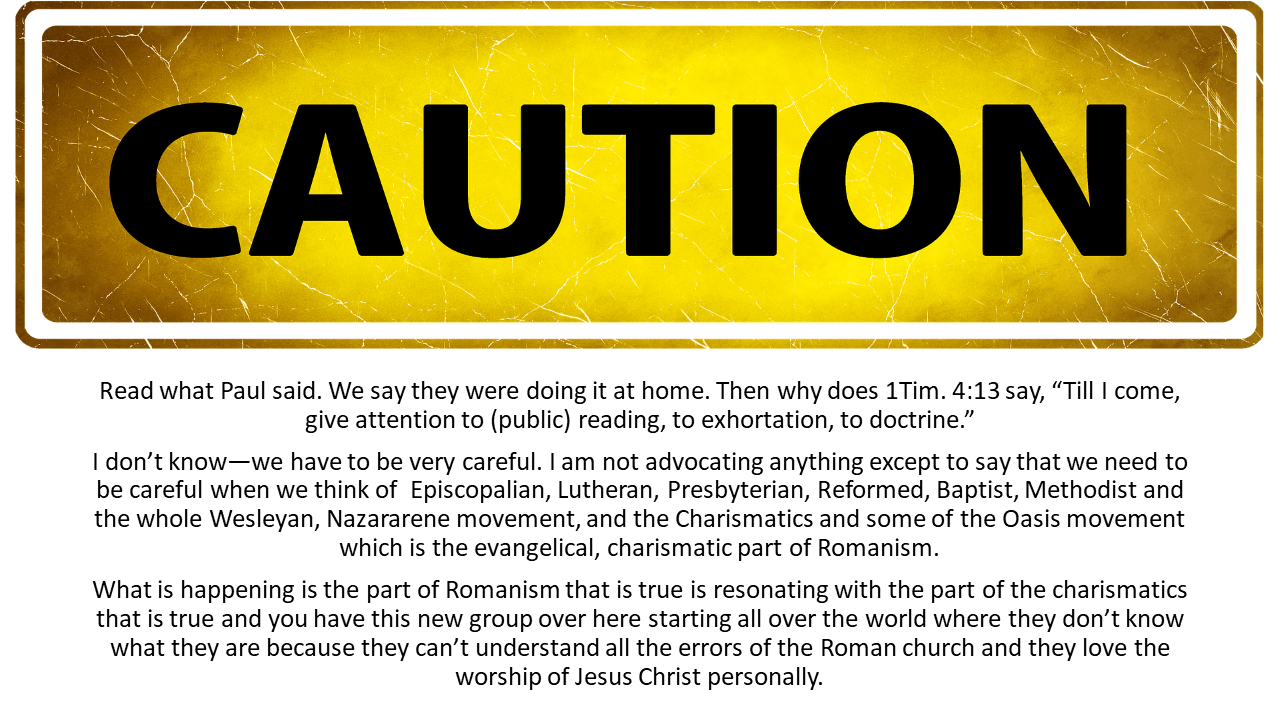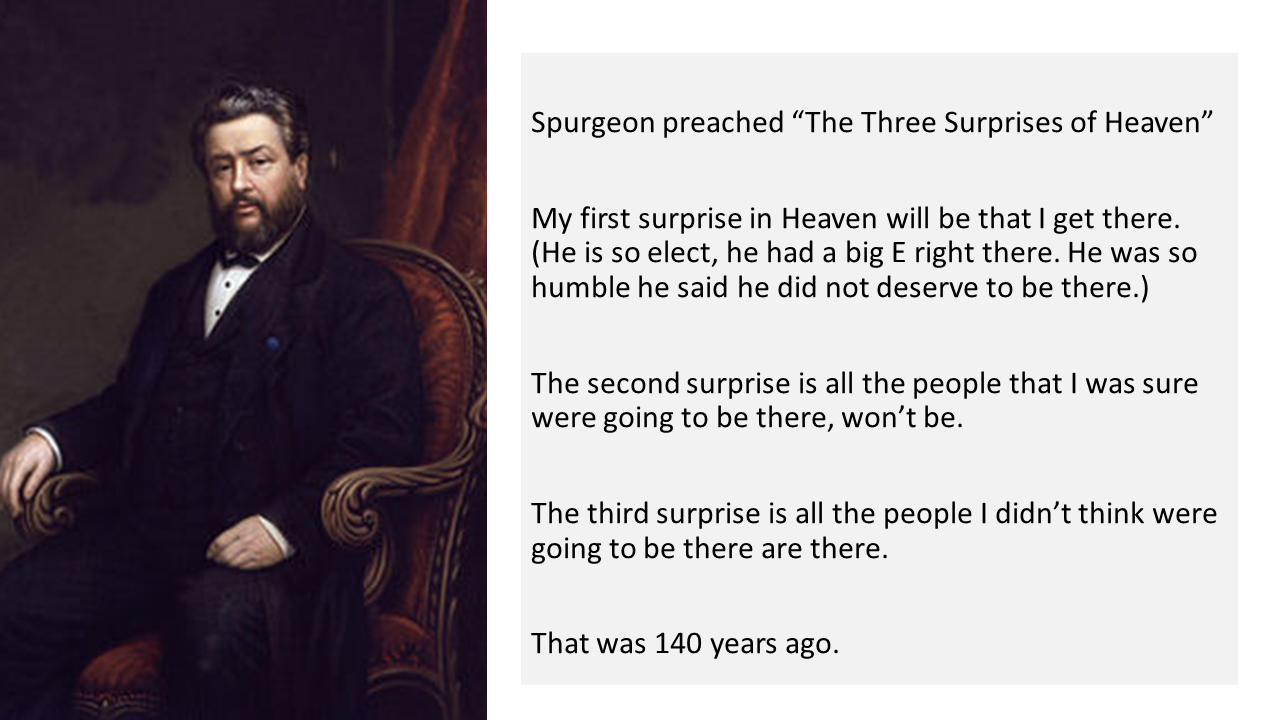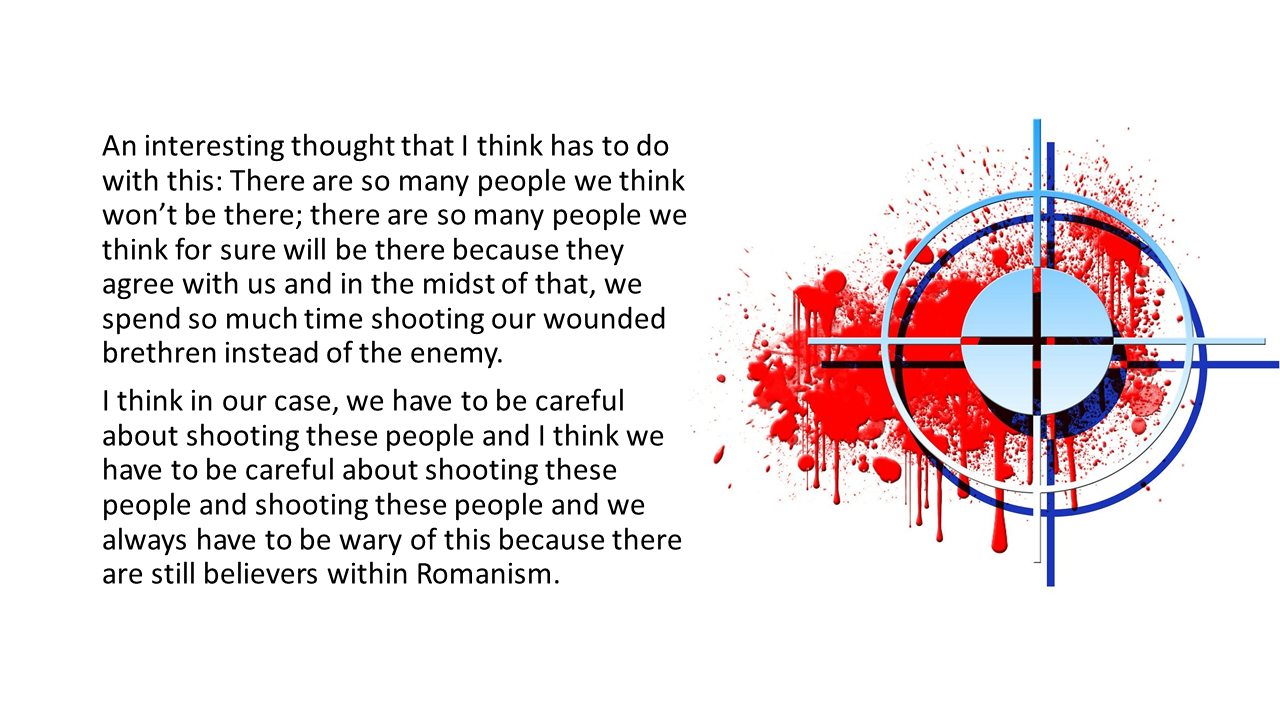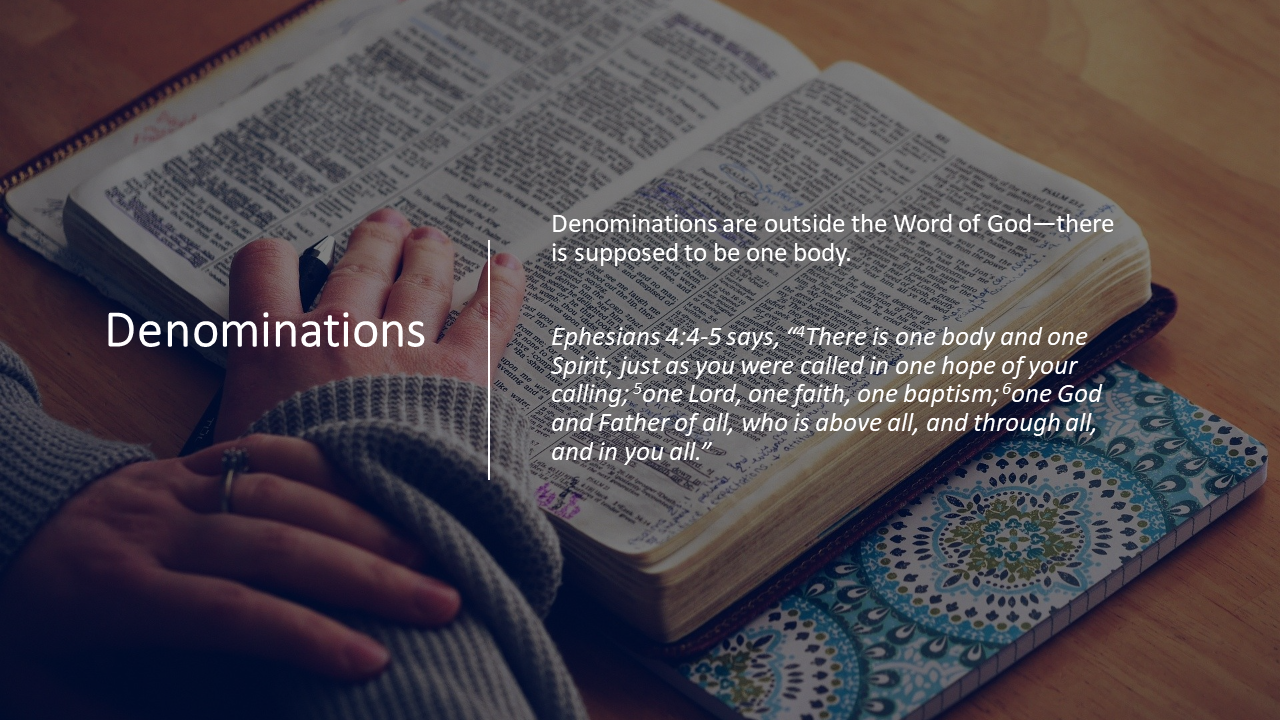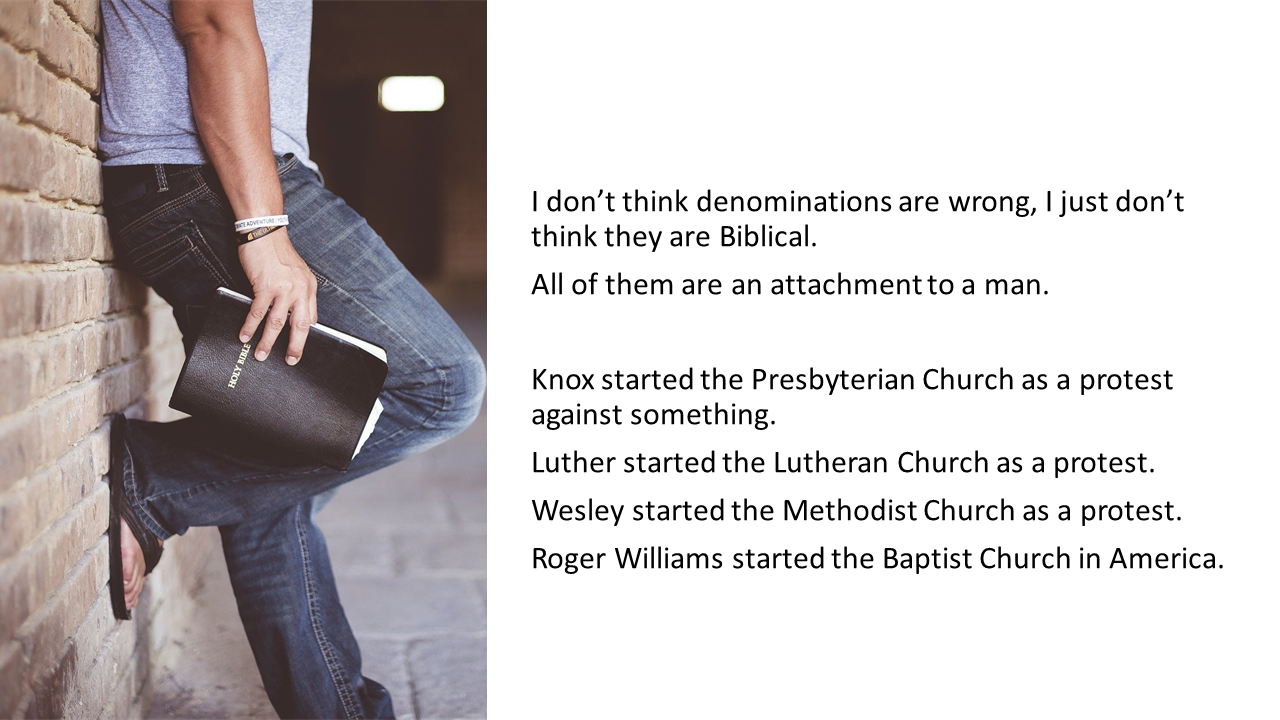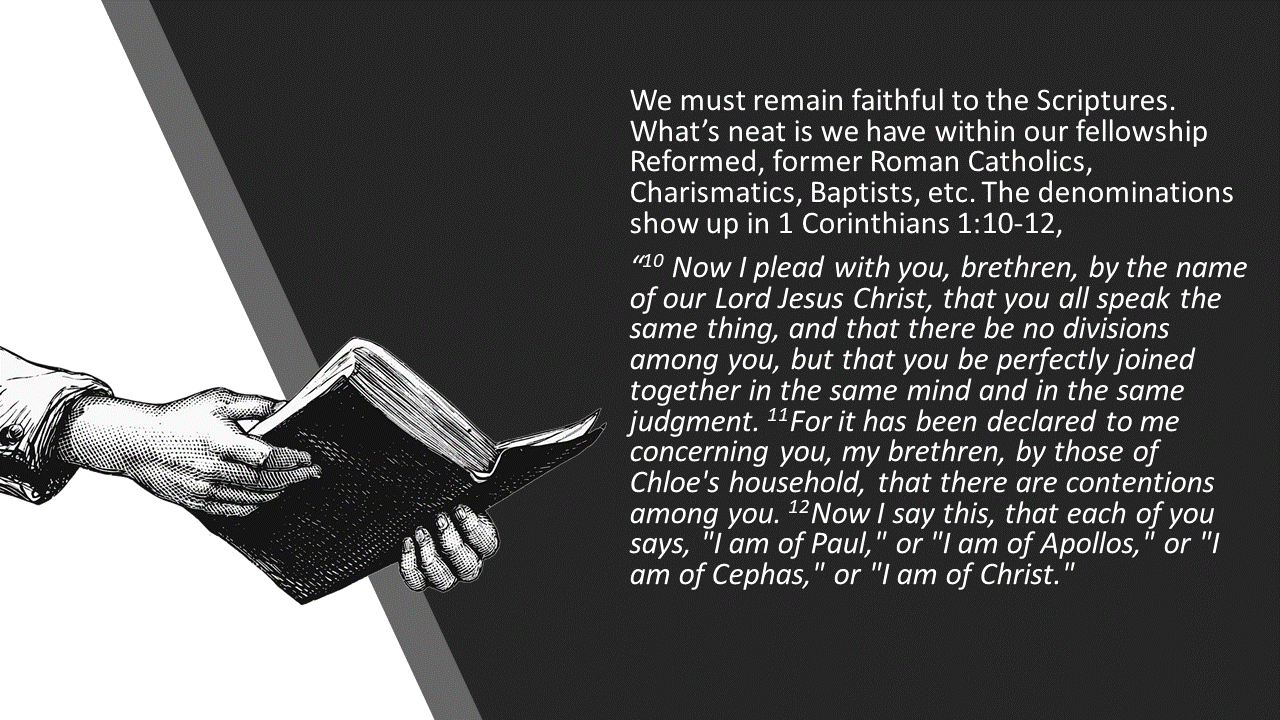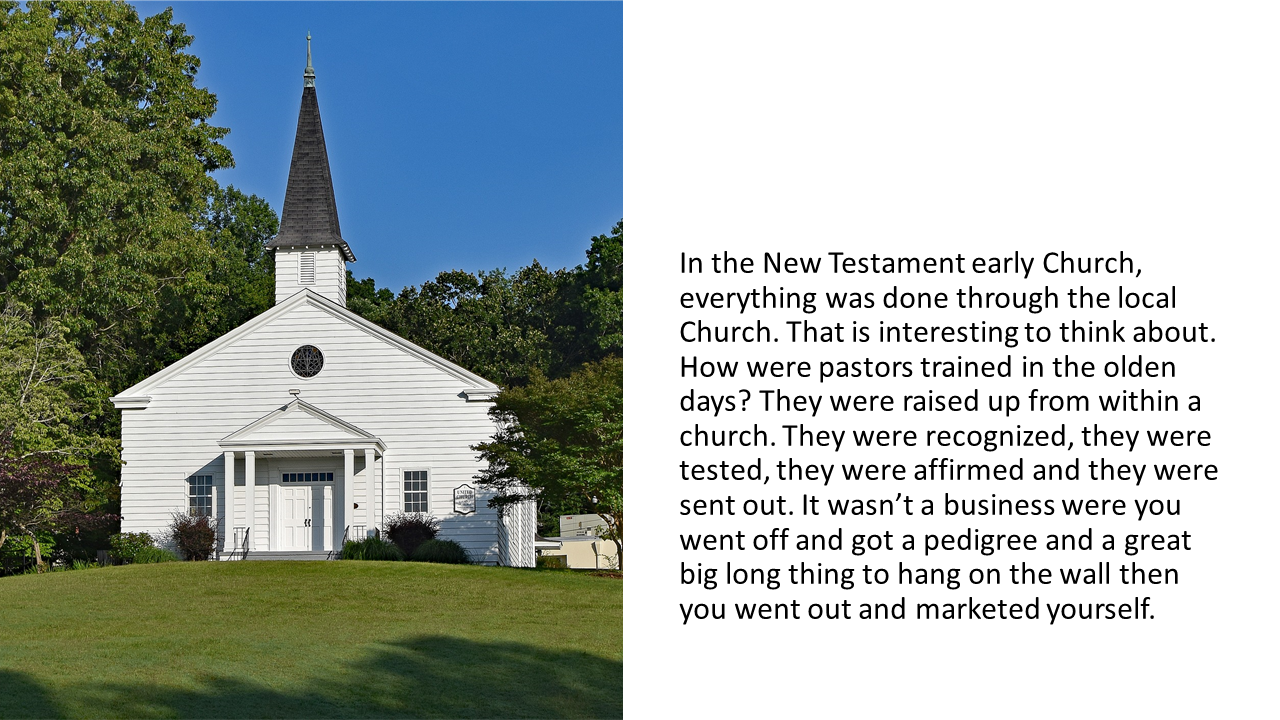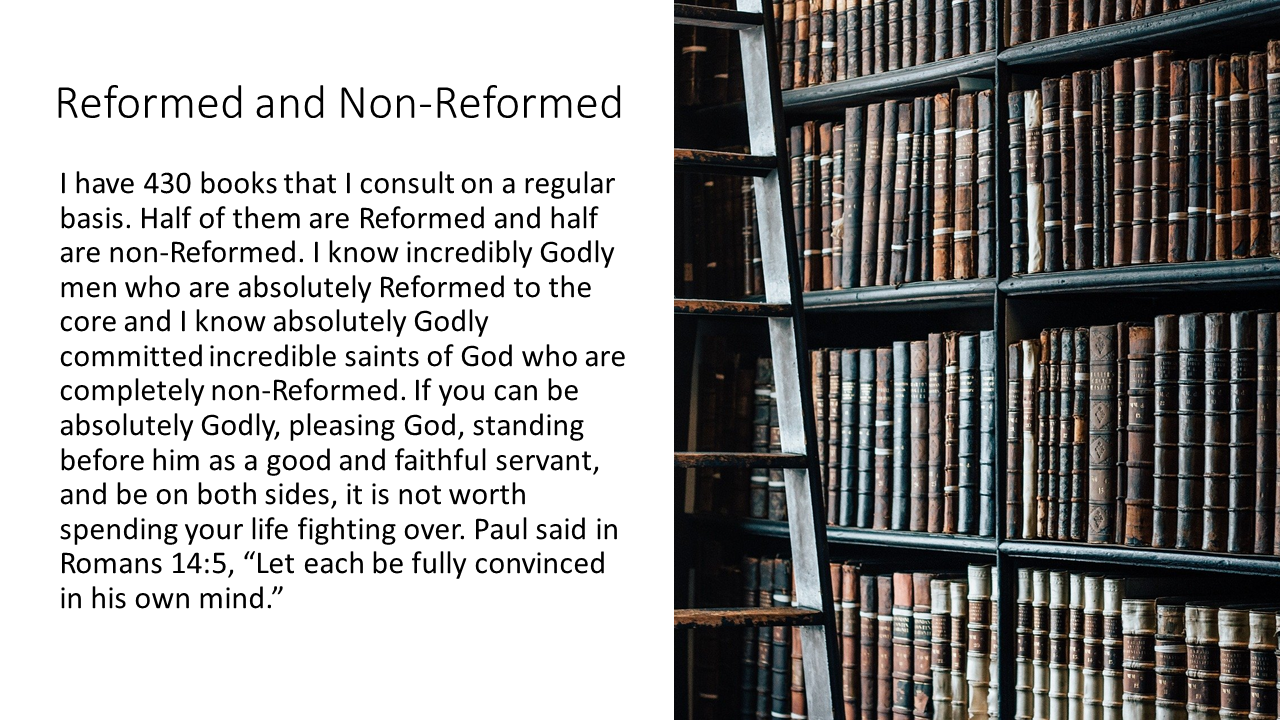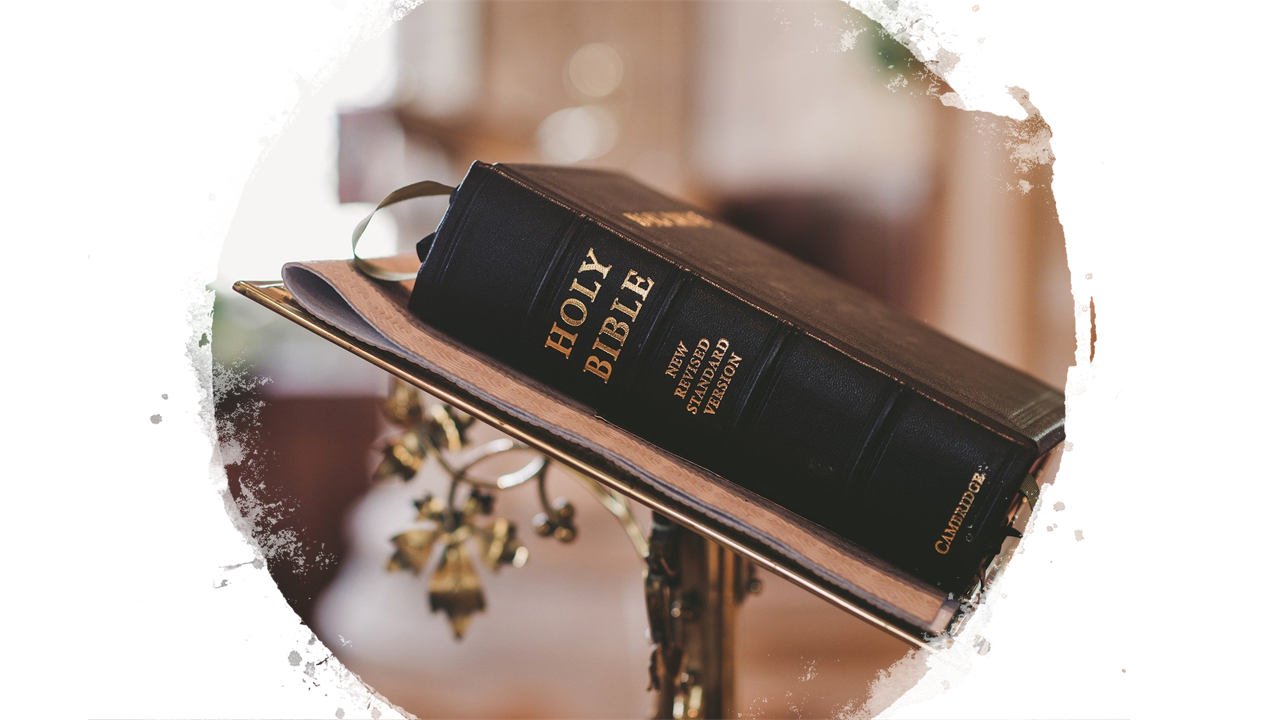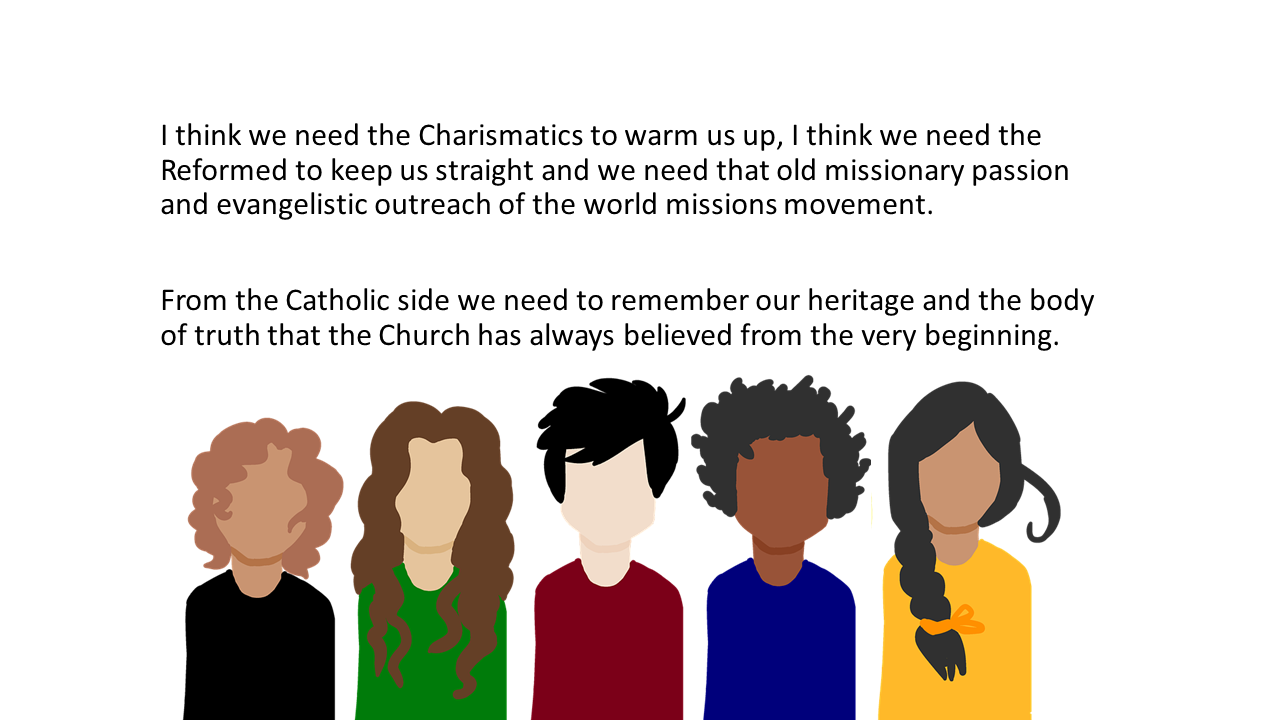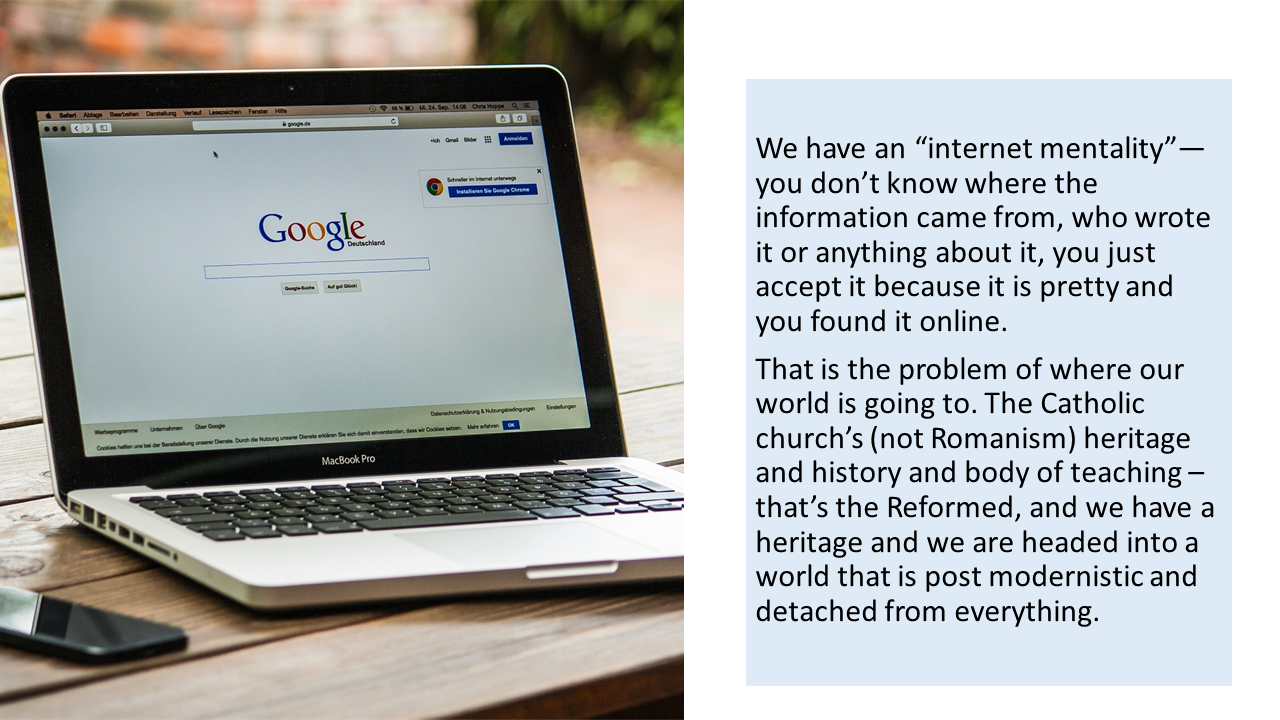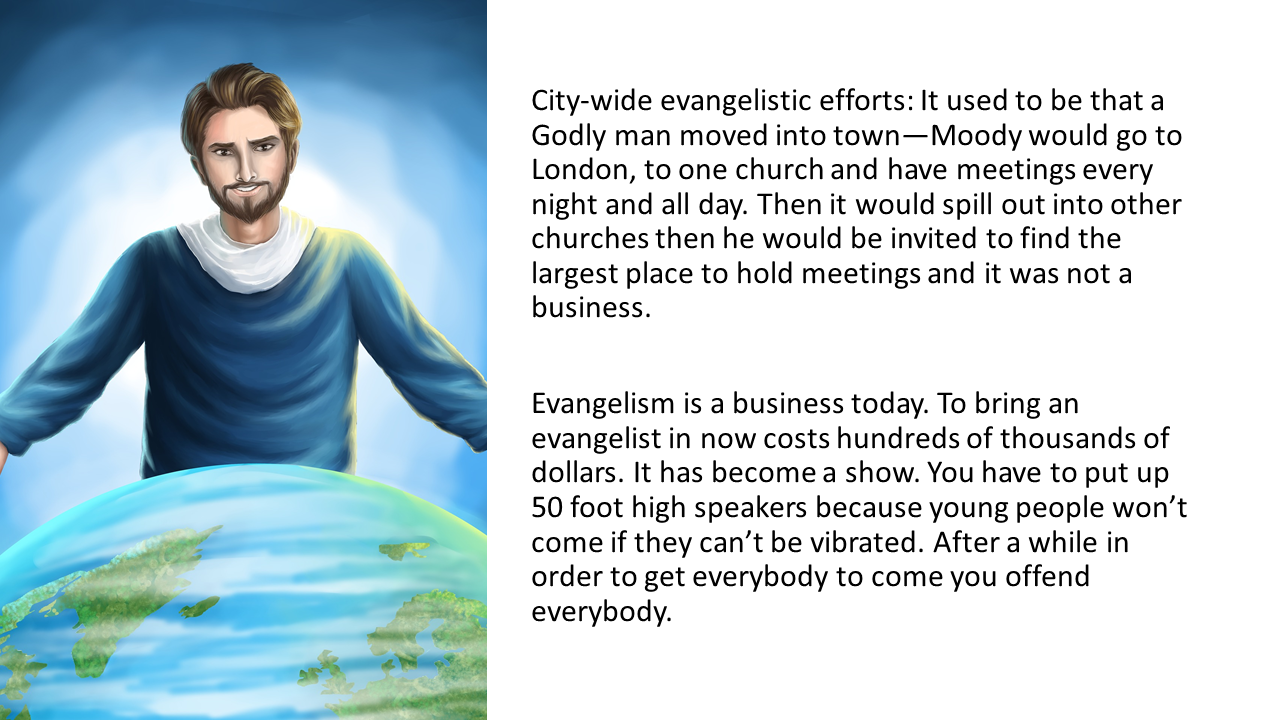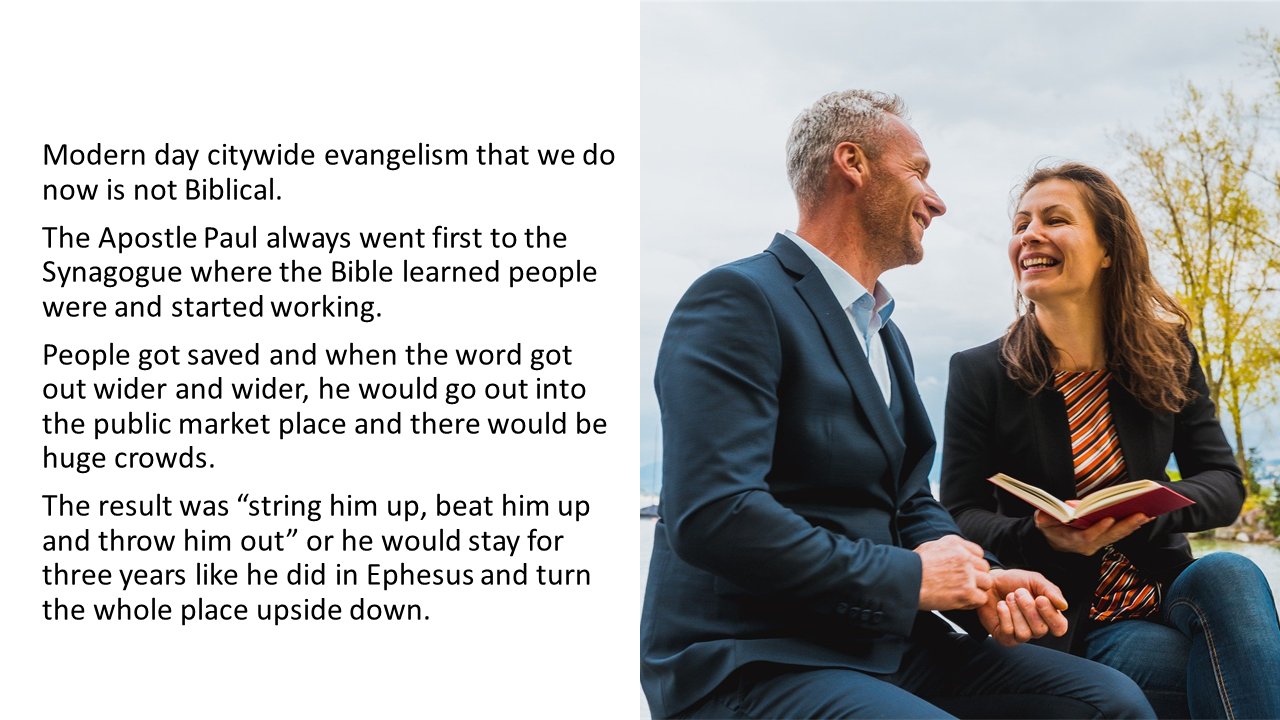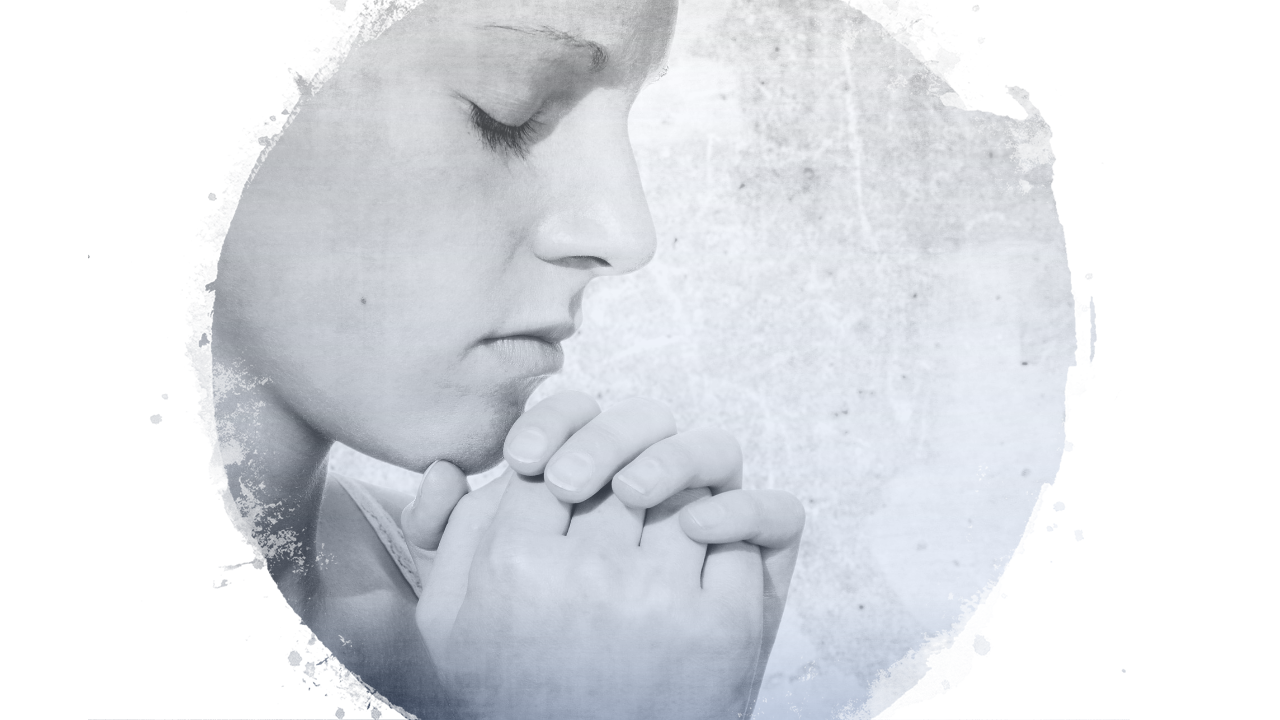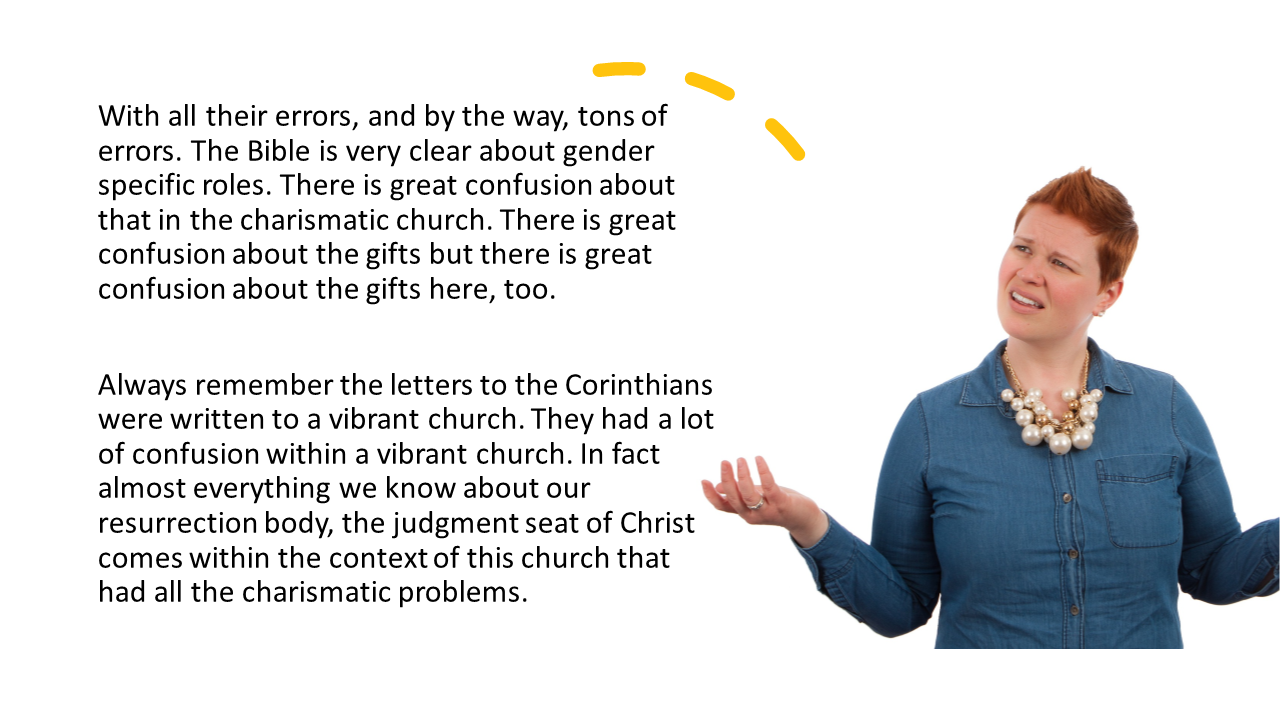Church of Today
APO-24 EBG-20 NR6-05 SPC-11
040111PM
Where did the Church of Today Come From Q&A
An Overview of Church History:
- The first era ends with the death of the Apostles.
- We started out with what we would call the Catholic Church. We are not talking about Pope’s or Rome, but the Church that Jesus Christ started. I am talking about the Church built on the Apostles and the Prophets. You would know this as the Apostles then those post-Apostolic men, Timothy all the way through to St. Augustine.
- After that about 13 centuries we have the Reformation— That was the time of Luther, Calvin, Zwingli and in England John Knox.
- After the Reformation a few hundred years went by and we had what we might call the era of evangelicalism or world missions. This era, the fourth era of the Church the Evangelical / World Missions you would know as the time of Wesley, Moody, Billy Graham.
- Then we have a new phenomenon today, which really is rapidly growing all over the world, the Charismatic era with the emphasis on the gifts.
 That is all of Church history. I will draw in a few more lines but that is everything. I am talking about the truth. We went from the Church that Jesus Christ started. A lot happened in 13 centuries then we had the dawning of the Reformation which actually started with Wycliffe in England with his work on the English translation of the Bible, Huss in Bohemia and CZECHOSLOVAKIA doing his Reformation speaking. It seeped into Martin Luther who was deeply influenced by Huss and Wycliffe”s work. Martin Luther deeply influenced and opened up so that a young Frenchman named John Calvin did his voluminous writing. Then of course it spread to the British Isles and John Knox. That’s the Reformation.
That is all of Church history. I will draw in a few more lines but that is everything. I am talking about the truth. We went from the Church that Jesus Christ started. A lot happened in 13 centuries then we had the dawning of the Reformation which actually started with Wycliffe in England with his work on the English translation of the Bible, Huss in Bohemia and CZECHOSLOVAKIA doing his Reformation speaking. It seeped into Martin Luther who was deeply influenced by Huss and Wycliffe”s work. Martin Luther deeply influenced and opened up so that a young Frenchman named John Calvin did his voluminous writing. Then of course it spread to the British Isles and John Knox. That’s the Reformation.
The Reformation dominated Christendom with a lot going on till the advent of what we would call the modern day evangelism, because the Reformation didn’t continue to emphasize evangelism. So they felt that they needed to do something about it—William Carey – the father of the modern missions movement. He was followed by a lot of evangelists—Moody, Billy Sunday, Billy Graham.
Now basically the modern day Charismatic movement started historically in Los Angeles at the Azuza Street Mission in the 1920’s where there was this outbreak of charismatic utterances. It started formally at Dennis Rector’s church in Los Angeles where officially a mainline church became charismatic. That was in the late 40’s or early 50’s.
Let me show you something that is really a blessing to me…
I am going to draw a line here- see this square? That square is the Word of God. What happened is this much today of the Catholic Church is quite Biblical (inside the square). This part was added- the Romanism- (outside the square). I witnessed to man who told me he was Roman Catholic and backed away from me. I smiled and said “I am Catholic, too.” He stepped toward me then and was excited but didn’t know what he was getting into. I told him that I am Catholic but not Roman Catholic. I am as Catholic as you can get—I believe in the Holy Catholic Church that Jesus Christ started—founded on the foundation of the Apostles and Prophets. I believe that Jesus Christ started the Church and that Church continues to this day and we are a part of it. It is right here, it is this truth that is a part of God’s Word.
Second Century
What happened? By the 2nd century the Church that Jesus Christ started already believed in infant baptism. Romanism started seeping then. By the 4thcentury beads, candles, robes, vestments, hierarchical levels of clergy—in fact there was a clergy/laity break. Only the clergy could handle the Communion.
Sixth Century
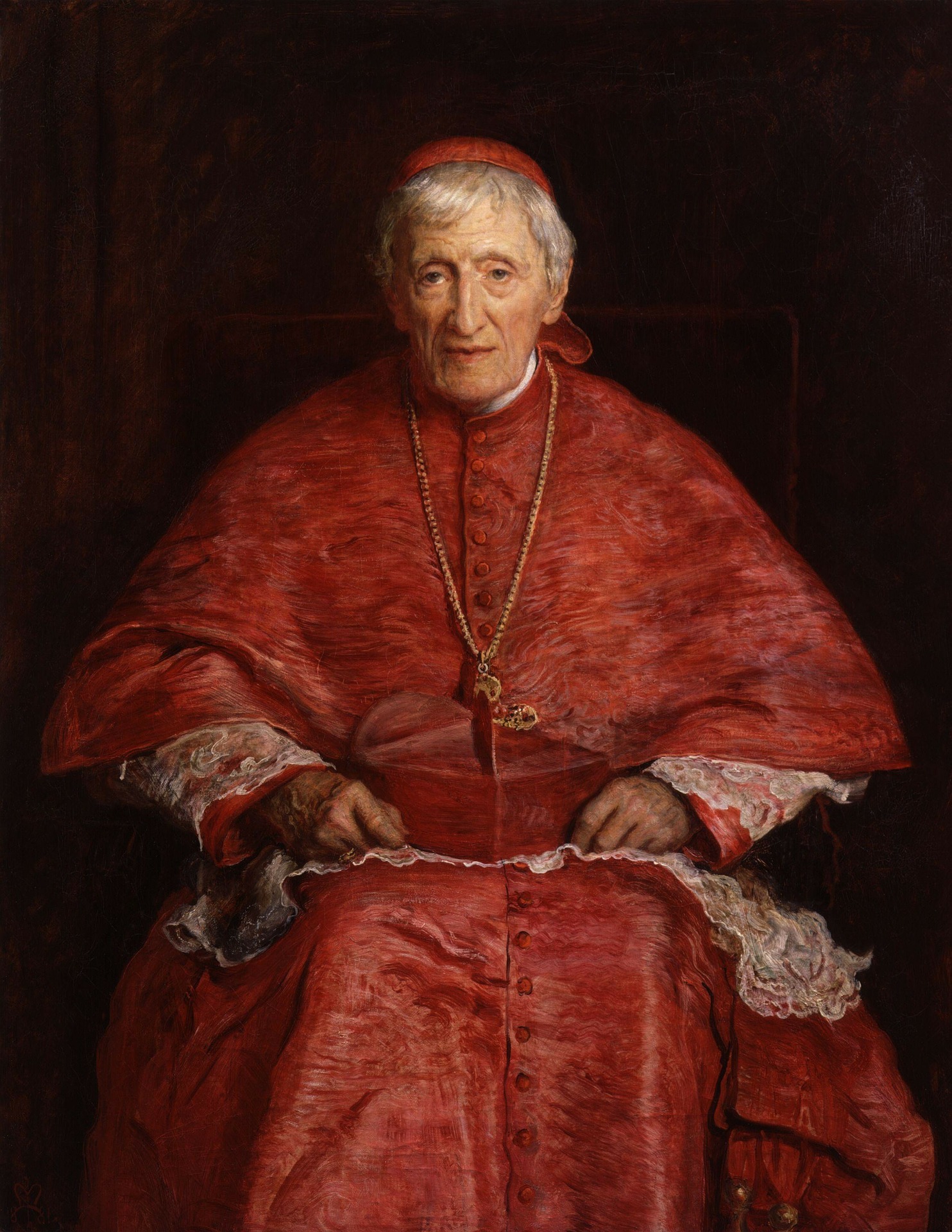 By the time the 6th century came, we have a full blown Pope. In the 9thcentury we have Mass in the sense we know it today with purgatory, indulgences, sacraments. It was not codified until the Council of Trent in the 16th century. You could all the way up to the Reformation be a very evangelical Catholic in the Roman Church because they did not “homogenize” the place and make them all toe the line until the Council of Trent in 1546. That is Romanism. What I am showing you is today, there is a great deal of the Roman Catholic Church that we can agree with 100%. They are Trinitarian, they believe in the Deity of Christ, they believe that the 66 books of the Bible that we believe in are inspired. They have added to them the Apocrypha and the Pseudopygrapha (sp??) and a whole bunch of traditions. At the core of their theology and Christology though they have added—The best way to poison someone is to take 99.5% wholesomeness and put in .5% something very deadly. That works salvation and non-imputational salvation is right at the heart of Romanism and that is the danger. There are people in the Roman Catholic Church who are born again. They don’t believe in that Mary stuff or I don’t agree with the Pope. I ask them how on earth can you support something that is so wrong—maybe they feel they are a missionary.
By the time the 6th century came, we have a full blown Pope. In the 9thcentury we have Mass in the sense we know it today with purgatory, indulgences, sacraments. It was not codified until the Council of Trent in the 16th century. You could all the way up to the Reformation be a very evangelical Catholic in the Roman Church because they did not “homogenize” the place and make them all toe the line until the Council of Trent in 1546. That is Romanism. What I am showing you is today, there is a great deal of the Roman Catholic Church that we can agree with 100%. They are Trinitarian, they believe in the Deity of Christ, they believe that the 66 books of the Bible that we believe in are inspired. They have added to them the Apocrypha and the Pseudopygrapha (sp??) and a whole bunch of traditions. At the core of their theology and Christology though they have added—The best way to poison someone is to take 99.5% wholesomeness and put in .5% something very deadly. That works salvation and non-imputational salvation is right at the heart of Romanism and that is the danger. There are people in the Roman Catholic Church who are born again. They don’t believe in that Mary stuff or I don’t agree with the Pope. I ask them how on earth can you support something that is so wrong—maybe they feel they are a missionary.
Between these two lines I would put the Lutheran Church. Here is the Presbyterian Church- that John Knox started. The Episcopal Church– I would put that right in here, too. You say what do you mean, put that there? Those three are kind of a little bit Romanistic and Reformed also. Why do I say that? They believe in infant baptism. They believe that you get into the Covenant by baptism. What the Jews used to have circumcision for has become Baptism today. The Roman Church says that God is done with Israel and will never pick up with them again and the Church has become the new Israel. Circumcision becomes baptism. The priesthood of the Old Testament becomes the priest of the New Testament. The sacrifices of the Levitical system become Mass. Moses and Aaron and the High Priests become the Pope. They have basically taken the Old Testament and given all New Testament names to it and they have built this whole works salvation thing that the Jews had.
The elements of that are in the Lutheran, Presbyterian and Episcopalian Churches today. The Episcopalian is the American version of the Anglican Church. The Anglican Church is the Roman Catholic Church that Henry VIII started- He set up his own Pope so he did not have to pay taxes to Rome. The Anglican Church is a revolt against the Catholic Church with a new Pope. The Lutherans and the Episcopalians are in constant talks to be reunited with Rome. In our lifetime if the Lord doesn’t return, we will see probably them back with Rome.
The Reformation hit and now I would say that all of this much of the Reformation is Biblical. Some of you immediately would not have any trouble saying that part of Romanism is not Biblical. But you start getting squeamish when you say that part of it is. That is because of this—I want you to understand why I say that about Reformation theology. This is another drawing that might help you learn.
This is the Bible (put a cross on it like a lot of Bible’s used to have); when you read the Bible, you and I read and get conclusions from the Bible like this. That is what we are supposed to do—that is how we build theology. We can get a conclusion about God, Christ, the Holy Spirit, about the Church, about salvation, about ecclesiology and all those things are very true. This right here is called theology or doctrine. All doctrine is to be tied back to the Bible. If you have Biblical doctrine, you can in any context explain it with no theology book present. You just take the Bible and open it up. In the historic early Church, they did not have this notion that everything had to be so defined and deep that you can’t understand it unless you have a doctorate in something. Paul reasoned with that group in Acts 17 from the Theology books—NO, the Scriptures.
Theology and the Bible
There is nothing wrong with theology, I have spent a lot of my life studying theology but I personally believe if you cannot explain what you believe merely from the  Bible, you should be careful about being dogmatic it, because immediately you are open to this. You take this conclusion here and this conclusion there from the Bible and you make another conclusion. You take this conclusion and make another conclusion. You know what , a lot of those conclusions are still true but they are no longer this belief right here- is no longer directly found in the Scriptures. You can only find it by having an awful lot of pages of discussion and saying because of this—because of this… That is what causes great divisions between people. Most of the things we divide over as churches are out here, not right there. Most things historically are out there. This process, drawing conclusions from the Bible is called doctrine or Biblical theology. This process when you take it this extra line, is called systematic theology. What is that? When you take the Bible and cut it all up in pieces and rearrange it in orderly manner. There is nothing wrong with it—you have to study systematic theology. The problem is that some of these conclusions out here get so detached from the Bible, it is what is called Theological drift. Right there is what most people have problems with. There is a portion of the Reformation doctrine that you can’t find in the Bible unless you quote some theologians. You can’t say Paul said it, you have to go back to Calvin himself or who ever.
Bible, you should be careful about being dogmatic it, because immediately you are open to this. You take this conclusion here and this conclusion there from the Bible and you make another conclusion. You take this conclusion and make another conclusion. You know what , a lot of those conclusions are still true but they are no longer this belief right here- is no longer directly found in the Scriptures. You can only find it by having an awful lot of pages of discussion and saying because of this—because of this… That is what causes great divisions between people. Most of the things we divide over as churches are out here, not right there. Most things historically are out there. This process, drawing conclusions from the Bible is called doctrine or Biblical theology. This process when you take it this extra line, is called systematic theology. What is that? When you take the Bible and cut it all up in pieces and rearrange it in orderly manner. There is nothing wrong with it—you have to study systematic theology. The problem is that some of these conclusions out here get so detached from the Bible, it is what is called Theological drift. Right there is what most people have problems with. There is a portion of the Reformation doctrine that you can’t find in the Bible unless you quote some theologians. You can’t say Paul said it, you have to go back to Calvin himself or who ever.
All those things are right out here and there is nothing wrong with them, but they are not to die for because they are not totally defined by and contained with in the Word of God. Just like you can find out here a lot of stuff. Let’s look at where we are—the whole Baptist, Billy Graham, Dallas Seminary, modern Christendom, Chuck Swindol, John MacArthur circle right there. Did you know that within that circle this is from the Bible. We have our own set of traditions that are not in the Bible. But we do them anyway. We fight for them, and fight over them, and everything else—they are not clearly defined in the Bible. They have become a part—
For example, you can’t find in the Bible Sunday School. There is the concept but you can’t find in the Bible that you must have an age graded Sunday school. That is just something we do. Yet people act like Paul did it, in fact I have heard people talk about in the early church when they had Sunday School, and their jowls start moving :>) when they do it and you can see a little froth because they just get excited. There are many things when you think about it that are wonderful but you didn’t see the New Testament Church doing them, you don’t see it commanded, you don’t see it even detailed.
For example, the idea of a solo pastor—not a pastor that sings. I am an ordained Baptist minister. The Baptists believe that there is one pastor and a whole bunch of deacons and the pastor is in charge. You can never find that in the New Testament- the elders are always in the plurality. In the Bible concept, there are three interchangeable words that are used for the same man. There is a word that is used to refer to a pastor or shepherd. There is presbuteros which is elder then there is episkopoi which is bishop or overseer. Those three words are always used interchangeably in the Bible. They are always plural- you never find them in the singular when it is talking about a church. God didn’t design the Baptist system, it evolved over the years. There is nothing wrong with it, I am not saying it is bad and it is not to be taken down but it is out here- (outside the square). Churches split and fight because someone introduces the idea of elder rule. Even though you find elders all through the New Testament but you won’t find the modern notion that runs most evangelical churches these days.
Did you know that a great deal of what the charismatic church does today is absolutely right? They do have wackos—If you see someone take their suit jacket off and whirl it around and knock down the congregation, you know you are off the page. If you see people crawling around on their hands and knees barking and foaming at the mouth—if you see people rolling, totally out of control, you never see that in the Scriptures. God is a God of order.
This would be the Methodist church, this would be the Wesleyan, Nazarene and that whole group. The Baptists are right here. So the Baptists and the Methodists are right over here between the Reformation and the Evangelical church. The post Reformation – by the way, it’s interesting— the north of the line here is Calvinistic, south of the line here is Armenian. A lot of modern day Christendom would be characterized as Armenian. In fact the Charismatics are Armenian—what I mean by that– able to lose your salvation—that’s a very loose description. The Charismatics, Wesleyans, Nazarenes, a lot of the Methodists would be Armenian. The Lutherans, Presbyterians, Episcopalians, Roman Catholic and Reformed would be Calvinistic. A lot of the Baptists and evangelicals and modern day Methodists and almost all of the Charismatics would be Armenian. (NOTE: the Rhema- ites are not Armenian. The men from there that I have had discussions with believe like we do on this point.) Look at how nicely everything pans out- it is almost like half and half. What is amazing about it is that everybody sees this part of everybody else—they all see everyone else’s errors. We just don’t see our own, usually. That is what Jesus talked about.
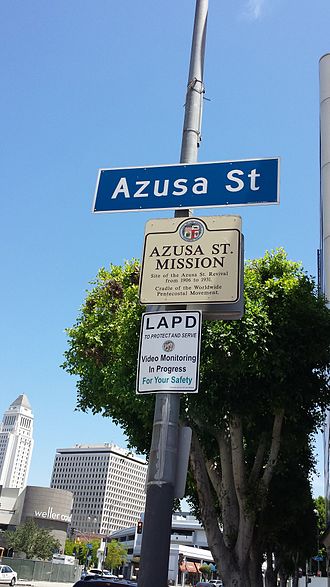 Let’s get back to the Charismatics. I see a historical progression. We started with Romanism—which took the Church away from the people. It took away the open Bible reading, study, the hymns, the interpretation of the Scripture—1John says you don’t need an interpreter, you have the Holy Spirit and He can reveal everything to you. We have an anointing from the Holy Spirit and that you have these gentlemen, pastors, elders and overseers who can spend their lifetime studying but all they do is encourage the saints to do that and you don’t need the pastor to get revelations directly from God and tell you what they are—you can get them yourself by being in God’s Word. (NOTE: is “revelation” the right word here? I was taught that there is no more revelation today, but we receive “illumination”)
Let’s get back to the Charismatics. I see a historical progression. We started with Romanism—which took the Church away from the people. It took away the open Bible reading, study, the hymns, the interpretation of the Scripture—1John says you don’t need an interpreter, you have the Holy Spirit and He can reveal everything to you. We have an anointing from the Holy Spirit and that you have these gentlemen, pastors, elders and overseers who can spend their lifetime studying but all they do is encourage the saints to do that and you don’t need the pastor to get revelations directly from God and tell you what they are—you can get them yourself by being in God’s Word. (NOTE: is “revelation” the right word here? I was taught that there is no more revelation today, but we receive “illumination”)
So the Roman church took the people out of the equation. The Reformation church brought back the music. Luther brought back the people studying the Scriptures but he left in the infant baptism and all the other bad things he shouldn’t have left in. So the Church began to decline again and get institutionalized until there was the outbreak of the modern, kind of freeing of the Church into independent churches instead of being under a hierarchy. You notice most of these have hierarchies – the Lutheran, Presbyterian, Episcopalian, Reformed and Roman. These churches don’t have hierarchies down here. There is an autonomy within Charismatic churches. The Southern Baptists- have a convention but there is still a lot of individual autonomy that you would never have up here in these more hierarchical churches- monarchical episcopate churches where you have a high up bishop over the whole thing.
Back to the Charismatics—what is interesting is—if we have gone from the early Church to the Reformation to the world mission era—it is almost like we are on a journey. Look where we are. Why would the charismatic event be going on in our world today? It could be that God has allowing something to happen because who is most involved in the world with the poor people? The Bible church movement? NO. The Baptists? Not really, not most of them. Who is most on the front lines of world missions right now? Not a lot any more from here, it’s here now. With all their errors, and by the way, tons of errors. The Bible is very clear about gender specific roles. (NOTE: what about all the single female missionaries sent out from Baptist and Bible churches over the years?? They acted as pastors, bishops, teachers, etc.) There is great confusion about that in the charismatic church. There is great confusion about the gifts but there is great confusion about the gifts here, too.
Always remember the letters to the Corinthians were written to a vibrant church. They had a lot of confusion within a vibrant church. In fact almost everything we know about our resurrection body, the judgment seat of Christ comes within the context of this church that had all the charismatic problems. But they were real believers, they had all those problems. Real believers that were misusing the gifts. So what we have to be careful of is because we do have lots of stuff that is not in the Scriptures here, we cannot take the whole thing and ditch it. Because the errors of the charismatic church are not at all like the errors of the Roman Catholic church. The Catholic church errors are damnable. If you believe Roman Catholic doctrine, you may not go to Heaven. If you believe the majority of charismatic doctrine, you will still go to Heaven. Do you understand the difference? This is a problem with salvation—Now I am not talking about out here—there are lots of really heretical things floating out here because there is no restraint. I am talking about what we would call the old Pentecostal movement.
Do you remember the old Pentecostal movement where people would all come forward and get on their knees and pray on the altar and people would kind of be excited in the service? I remember when I lived in the south I would go once in a while just for fun to a Pentecostal church just because they didn’t ever get staid and placid. If the pastor said something, they would get all excited about it. When they sang songs, they ran around while they sang them. There used to be a guy called Sunshine always sat in the back and about the fourth song he started getting worked up and pretty soon by the fifth song, he would be running laps. He would jump up on the platform run behind the pastor, jump off, run over there, go out the door, run back in. He got the whole church excited. They would all start singing even more. I thought, “great, we need a Sunshine in every church.” I don’t recommend it but I am saying we get kind of cold.
Why do we have so many songs about lifting hand, why do we have the New Testament Church lifting their hands, why do we have the Old Testament believers  raising their hands and we don’t? Because of this—we don’t want to associate with anything that is erroneous even though we have all of our own errors. So we throw out something that is in the Bible, NEW TESTAMENT, 1Timothy 2 “I will therefore that men pray every where, lifting up holy hands, without wrath and doubting.” If you were a Godly man, you lifted holy hands as you prayed. We wouldn’t think of it. In fact we would ask people to sit in the back because it might offend someone. How can you be offended when you are doing something that is actually commanded? Read what Paul said. We say they were doing it at home. Then why does 1Tim. 4:13 say, “Till I come, give attention to (public) reading, to exhortation, to doctrine.” I don’t know—we have to be very careful. I am not advocating anything except to say that we need to be careful when we think of Episcopalian, Lutheran, Presbyterian, Reformed, Baptist, Methodist and the whole Wesleyan, Nazararene movement, and the Charismatics and some of the Oasis movement which is the evangelical, charismatic part of Romanism.
raising their hands and we don’t? Because of this—we don’t want to associate with anything that is erroneous even though we have all of our own errors. So we throw out something that is in the Bible, NEW TESTAMENT, 1Timothy 2 “I will therefore that men pray every where, lifting up holy hands, without wrath and doubting.” If you were a Godly man, you lifted holy hands as you prayed. We wouldn’t think of it. In fact we would ask people to sit in the back because it might offend someone. How can you be offended when you are doing something that is actually commanded? Read what Paul said. We say they were doing it at home. Then why does 1Tim. 4:13 say, “Till I come, give attention to (public) reading, to exhortation, to doctrine.” I don’t know—we have to be very careful. I am not advocating anything except to say that we need to be careful when we think of Episcopalian, Lutheran, Presbyterian, Reformed, Baptist, Methodist and the whole Wesleyan, Nazararene movement, and the Charismatics and some of the Oasis movement which is the evangelical, charismatic part of Romanism.
What is happening is the part of Romanism that is true is resonating with the part of the charismatics that is true and you have this new group over here starting all over the world where they don’t know what they are because they can’t understand all the errors of the Roman church and they love the worship of Jesus Christ personally. All that to say that the Church- In fact Spurgeon preached “The Three Surprises of Heaven”- My first surprise in Heaven will be that I get there. He is so elect, he had a big E right there. He was so humble he said he did not deserve to be there. The second surprise is all the people that I was sure were going to be there, won’t be. The third surprise is all the people I didn’t think were going to be there are there. That was 140 years ago.
An interesting thought that I think has to do with this: There are so many people we think won’t be there; there are so many people we think for sure will be there because they agree with us and in the midst of that, we spend so much time shooting our wounded brethren instead of the enemy. I think in our case, we have to be careful about shooting these people and I think we have to be careful about shooting these people and shooting these people and we always have to be wary of this because there are still believers within Romanism.
Denominations
Denominations are outside the Word of God—there is supposed to be one body.
Ephesians 4:4-5 says, “4There is one body and one Spirit, just as you were called in one hope of your calling; 5one Lord, one faith, one baptism; 6one God and Father of all, who is above all, and through all, and in you[1] all.”
I don’t think denominations are wrong, I just don’t think they are Biblical. All of them are an attachment to a man. Knox started the Presbyterian Church as a protest against something. Luther started the Lutheran Church as a protest. Wesley started the Methodist Church as a protest. Roger Williams started the Baptist Church in America.
We must remain faithful to the Scriptures. What’s neat is we have within our fellowship Reformed, former Roman Catholics, Charismatics, Baptists, etc. The denominations show up in 1Corinthians 1:10-17,
“10 Now I plead with you, brethren, by the name of our Lord Jesus Christ, that you all speak the same thing, and that there be no divisions among you, but that you be perfectly joined together in the same mind and in the same judgment. 11For it has been declared to me concerning you, my brethren, by those of Chloe’s household, that there are contentions among you. 12Now I say this, that each of you says, “I am of Paul,” or “I am of Apollos,” or “I am of Cephas,” or “I am of Christ.” 13Is Christ divided? Was Paul crucified for you? Or were you baptized in the name of Paul?
14I thank God that I baptized none of you except Crispus and Gaius, 15lest anyone should say that I had baptized in my own name. 16Yes, I also baptized the household of Stephanas. Besides, I do not know whether I baptized any other. 17For Christ did not send me to baptize, but to preach the gospel, not with wisdom of words, lest the cross of Christ should be made of no effect.”
 It is not that you should jump out of a denomination, denominations identify what you believe. A lot of people don’t know what their denominations believe fully and that is part of the problem, too. Seminaries, Bible colleges, mission agencies and Sunday school are extra-Biblical, too. In the New Testament early Church, everything was done through the local Church. That is interesting to think about. How were pastors trained in the olden days? They were raised up from within a church. They were recognized, they were tested, they were affirmed and they were sent out. It wasn’t a business were you went off and got a pedigree and a great big long thing to hang on the wall then you went out and marketed yourself. We are becoming so worldly and people wonder why there is constant falling of pastors. It is because no one knows them personally, knows their heart, their character, personal devotion, they just know whether or not their books sell. They are not trained in the local church and recruited and brought in. There is a lot of problems with that.
It is not that you should jump out of a denomination, denominations identify what you believe. A lot of people don’t know what their denominations believe fully and that is part of the problem, too. Seminaries, Bible colleges, mission agencies and Sunday school are extra-Biblical, too. In the New Testament early Church, everything was done through the local Church. That is interesting to think about. How were pastors trained in the olden days? They were raised up from within a church. They were recognized, they were tested, they were affirmed and they were sent out. It wasn’t a business were you went off and got a pedigree and a great big long thing to hang on the wall then you went out and marketed yourself. We are becoming so worldly and people wonder why there is constant falling of pastors. It is because no one knows them personally, knows their heart, their character, personal devotion, they just know whether or not their books sell. They are not trained in the local church and recruited and brought in. There is a lot of problems with that.
I have 430 books that I consult on a regular basis. Half of them are Reformed and half are non-Reformed. I know incredibly Godly men who are absolutely Reformed to the core and I know absolutely Godly committed incredible saints of God who are completely non-Reformed. If you can be absolutely Godly, pleasing God, standing before him as a good and faithful servant, and be on both sides, it is not worth spending your life fighting over. Paul said in Romans 14:5, “Let each be fully convinced in his own mind.”
I think our church is a nice blend. I remember when we first came here in 1995 I stood here and looked up in the balcony and there was a family in which all the ladies wore head coverings. On the other side were some who had painter’s pants and t-shirts on. I saw the whole spectrum in one church. I had never been in a place where you have not only all the theological spectrum but you even have all the personal standard spectrum. I have never seen it work like that under one roof. Usually churches polarize.
TBC has a document called “What We Teach” which was my response to the Elders when they asked me about my doctrine. That was the doctrinal statement that I had been a part of at Grace Community Church- The 50 Elders there studied that with John MacArthur. I knew what that document meant to me, however when it came here, some people really resonated up above the line and really got excited. Some people down here got all troubled. We are going through that document now, and are only retaining the parts that you can defend from Scripture without having John Murray or John Wesley. Without having John Calvin or Armenius. You just have to be able to defend it from the Bible because we are seeking as Elders to not polarize our church either way. There are extremes in Calvinism and Amenianism- and we are not interested in either. We are interested in preserving the heritage of systematic doctrine that Reformed people have and the feel, the love, the compassion, the ministry and humility that the non-Reformed people have.
If you are in Tulsa and you have a food kitchen or a homeless center, 99 out of 100 will be the Armenian and Charismatics. They tend to have all the enthusiasm and compassion and the Reformed have all the doctrine and truth—I THINK YOU SHOULD MIX IT ALL UP REAL WELL. Like the first cake I ever made—I just dumped everything in and put it in the oven and it never mixed and it wasn’t a cake. The church has to be “fitly framed together” as it says in Ephesians 2:20-22,
“20 And are built upon the foundation of the apostles and prophets, Jesus Christ himself being the chief corner stone;
21 In whom all the building fitly framed together groweth unto an holy temple in the Lord:
22 In whom ye also are builded together for an habitation of God through the Spirit.” (KJV)
I think we need the Charismatics to warm us up, I think we need the Reformed to keep us straight and we need that old missionary passion and evangelistic outreach of the world missions movement. From the Catholic side we need to remember our heritage and the body of truth that the Church has always believed from the very beginning.
We have an “internet mentality”—you don’t know where the information came from, who wrote it or anything about  it, you just accept it because it is pretty and you found it online. That is the problem of where our world is going to. The Catholic church’s (not Romanism) heritage and history and body of teaching – that’s the Reformed, and we have a heritage and we are headed into a world that is post modernistic and detached from everything. That’s why it is good to hold a Bible. Most of the men that I went through seminary with 10 years ago, didn’t carry one of these anymore. They had a personal digital copy. I said how can you have tear stains on your PDA or your notebook computer? How do you know what you are reading and what it is tied to because it is all electronic and can be changed instantaneously? There doesn’t seem to be a tie to something you can hold on to and that is where our world is going and we have to be careful of that. People in most evangelical churches don’t bring Bibles anymore. They project it—you don’t need a Bible, you don’t need anything, just come and go—touch and go church.
it, you just accept it because it is pretty and you found it online. That is the problem of where our world is going to. The Catholic church’s (not Romanism) heritage and history and body of teaching – that’s the Reformed, and we have a heritage and we are headed into a world that is post modernistic and detached from everything. That’s why it is good to hold a Bible. Most of the men that I went through seminary with 10 years ago, didn’t carry one of these anymore. They had a personal digital copy. I said how can you have tear stains on your PDA or your notebook computer? How do you know what you are reading and what it is tied to because it is all electronic and can be changed instantaneously? There doesn’t seem to be a tie to something you can hold on to and that is where our world is going and we have to be careful of that. People in most evangelical churches don’t bring Bibles anymore. They project it—you don’t need a Bible, you don’t need anything, just come and go—touch and go church.
The Gift of Tongues
What ever our view of the Gifts is, they come back in the Tribulation because the 144,000 have the genuine gift of tongues. The gift of tongues in the Bible was speaking a real language that you have never learned. In Acts 2 you find Jewish preachers speaking the languages of 21 different nationalities of people. The 144,000 Jewish evangelists who are ministering around the world during the Tribulation speak to every kindred, tongue, tribe and nation. They can speak any language in the world.
City-wide evangelistic efforts: It used to be that a Godly man moved into town—Moody would go to London, to one church and have meetings every night and all day. Then it would spill out into other churches then he would be invited to find the largest place to hold meetings and it was not a business. Evangelism is a business today. To bring an evangelist in now costs hundreds of thousands of dollars. It has become a show. You have to put up 50 foot high speakers because young people won’t come if they can’t be vibrated. After a while in order to get everybody to come you offend everybody. So you have to decide…
Modern day citywide evangelism that we do now is not Biblical. The Apostle Paul always went first to the Synagogue where the Bible learned people were and started working. People got saved and when the word got out wider and wider, he would go out into the public market place and there would be huge crowds. The result was “string him up, beat him up and throw him out” or he would stay for three years like he did in Ephesus and turn the whole place upside down. Now, I think because of Finney, he mechanized evangelism—he said if you do this and this and this long enough, you will have a revival. People have bought in to that and I don’t think we need to call in a “big gun”—if all the Christians got serious—if every person in Tulsa Bible Church began to live a holy life with no secret leaven in their life and was in the Word and had a Godly family setting in their home and then started learning how to fast and pray, we would not have enough room for all the new believers (not for all the church hopping people) that we would influence by our lives. All of us individually need to decide what we want to answer to the Lord for when we stand before Him not too long from now.
If we really get serious about it, we would clean up our lives, we would start learning how to fast and pray, we would start learning how to worship so much that we would come into church hot, full of the Spirit of God that the unbelievers would take note and see that God is in that place.
Slides
Check Out All The Sermons In The Series
You can find all the sermons and short clips from this series, Apologetics – Church History here
Looking To Study The Bible Like Dr. Barnett?
Dr. Barnett has curated an Amazon page with a large collection of resources he uses in his study of God’s Word. You can check it out here.

